#stories and archetypes and escapism
Explore tagged Tumblr posts
Text



assorted quotes from the introduction of Monstrous Children and Childish Monsters: Essays on Cinema’s Holy Terrors
#ok only the introduction of this book is good all these essays are BAD#writing notes on the pilot flashback/jess' death and once again ruminating on sam as the story's original monster#sam was THE og spn creepy child. horror's monstrous-child archetype. the holy terror#finalgirlsamwinchester is just a ruse this is the sam + horror trope i'm most interested in#does anyone get me. he's regan from the exorcist. the archetypal child as the entry point drawing evil into the family home#the first quote really encapsulates how both john and later dean view sam -> the 'conflation of innocence and fear'#innocence/inhumanity -> requiring control. monitoring. containment -> 'i want you to watch out for sammy okay' (2.01)#'to find our innocence we must destroy it; we return to the child within in order to kill it'#also. 'monsters are monstrous because they always escape human comprehension'#^ the mantra i'm gonna tell myself next time i see someone totally misunderstanding sam lmao#ok saving the rest for an actual analysis#sam monstrosity studies#lit recs#j.txt
41 notes
·
View notes
Text
In every work, there is a delineation between main characters and peripheral characters. This is more marked in non-realist fiction, where the story is more bound by conventions of narrative than imitations of history. Main characters, because of what fiction does, are more influential, independent, complex, unlikely, and remarkable than peripheral characters because they are the main characters. It wouldn’t work otherwise.
The conservation of character (save the most stuff for the ones that are important / focus the story around the most consequential characters) means that any reader of more than a few works will automatically consider the characters of a story in two different classes: those who do and those who don’t; paper dolls that interact with the paper scenery VS crayon outlines on the paper scenery.
In works that try to maintain a depth of detail similar to histories/to reality, the sharp delineation of main character from side character can break immersion. Functionally, it’s harder to make a story work if the main characters don’t think or do anything (though people have tried) and the side characters do. But, a work aiming for the emotional stakes of realism needs to convince you that the main characters are part of a greater world populated by fellow human beings.
When main characters ‘get away’ with improbable actions or side characters ‘get shafted’ by being assigned definite traits with no story arc, the expectations of a realistic world clash with the expectations of story. A side character given any details must be important, and if they are given detail without story, then it can feel like a failure of the work (even if the author was just trying to splash in some flavour). A main character loses resonance if their role in the story can only be explained by ‘these events needed to happen’ rather than by the emotional coherent choices of a plausible person. The boundaries between main and side characters must be maintained for a realist (non-formal) fiction to communicate effectively. If it’s formal……you get a bit more lenience when you can just write ‘this is the main character and you know it’ into the text.
Which brings us to: it’s easy to read a metatextual (am I using this right. Probs not.) hierarchy realistic stories. Side characters are, within their own world, designated losers. They can’t have any impact on their own lives, otherwise they’d be main characters. Nowhere is this boundary sharper than in RPGs. NPC story arcs have be handled on the side by one very busy co-author, while PC story arcs each get one author’s full attention. The NPCs are. Well. NPCs. Tulpas. Shapes of shapes of people, shadows of the shadows on the cave wall. They are imperfect imitations of PCs, which are themselves imitations of people that might possibly exist.
That then creates a massive opening in any RPG (video game or tabletop) to play with player or audience expectations about NPCs. If they’re predetermined to be city guards repeating the same line of dialogue forever, you can easily get a strong audience reaction from having them break out of these roles. The NPC is a creation that, ironically, is the character any audience member is most likely to be like. So the event of an NPC (a true NPC merchant in the town square) breaking into the story to influence it is catnip to Moi
#kelsey rambles#a point that makes no sense to anyone is that I like stories that play with the main character side character class hierarchy#discworld. granny and vimes are designated side characters who just happen to find themselves interacting with the real stories#granny is the evil witch to the various youngsters and vimes is the grungy mentor to the real hero carrot#but their books are all about them as self-aware fantasy archetypes trying to break out of the reader’s expectations#which resonates deeply! are we not all desperately trying to escape the routines of life#or THE CAPTAIN. ORIMAR VALE HIMSELF. physically fighting his way from NPC to PC#being a PC is being alive is being real in that storyline
1 note
·
View note
Text
gaza scam warning
I'm locking this post because it was about the original wave of gaza-scams and is now outdated when it comes to recent real fundraisers that have been appearing on Tumblr. Please don't pass up people in need because you're afraid of scams. Identifying scams from the real fundraisers is easy.
@el-shab-hussein does a lot of vetting on Tumblr. @nabulsi is another reliable user who has done vetting (but as of this time is not vetting new posts). @90-ghost is a real palestinian person but they don't do a lot of in-depth vetting.
el-shab-hussein and nabulsi have a vetted fundraiser google sheet. el-shab-hussein has a list of direct contacts in gaza/yemen who are certifiably real people. operation olive branch is a coordinated effort to gather certified crowdfunding campaigns both for families and humanitarian provisions.
When you receive an ask, check any of the above resources to see if they're there. Some also have pre-existing social media accounts, such as Instagram, that they certify as theirs and prove that they are a real person in Palestine. Scroll down their blog, look at the notes in their post, and look for confirmation that they are verified anywhere (do not trust their claims until you see the confirmation yourself).
Then if you see confirmation that they are a real person in Palestine who needs help, reblog their post and maybe donate $5.
Feel free to message me about anyone who sends you an ask that seems suspicious and I'll tell you if they resemble any scam archetypes I've seen.
Original post:
Hey gamers, recently there have been a number of scam blogs on tumblr claiming to be Gazan victims. They've been making a number of iterations of the exact same blog and story but with different names and sometimes different PayPal links.
Thus far, the content of these scams are being stolen from 2 real fundraisers. Please lend your aid to these people who need help instead of the disgusting scam farm
Help Haya Orouq's family escape Gaza
Help Rawan AbuMahady's family escape Gaza
These are examples within the past month which have been deleted.
Ma22ya
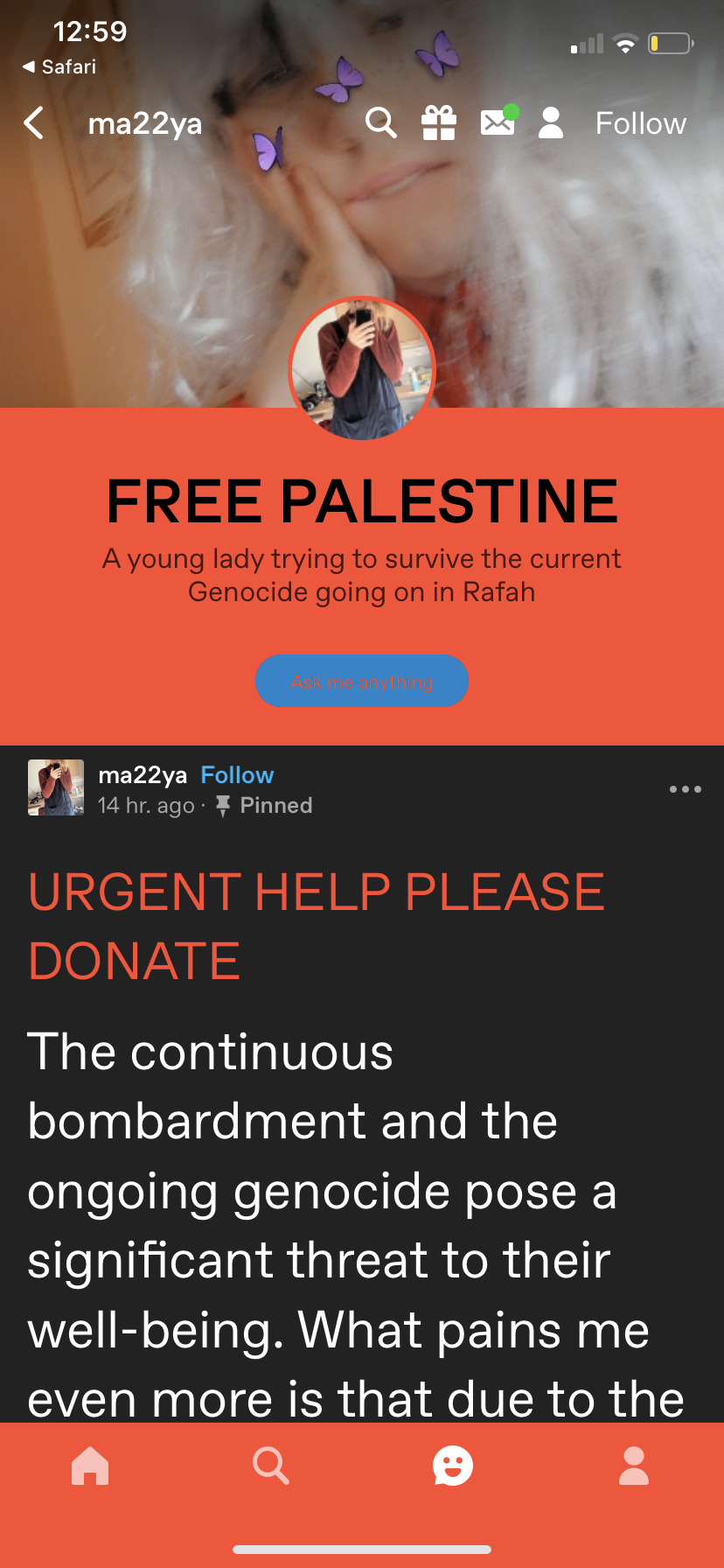
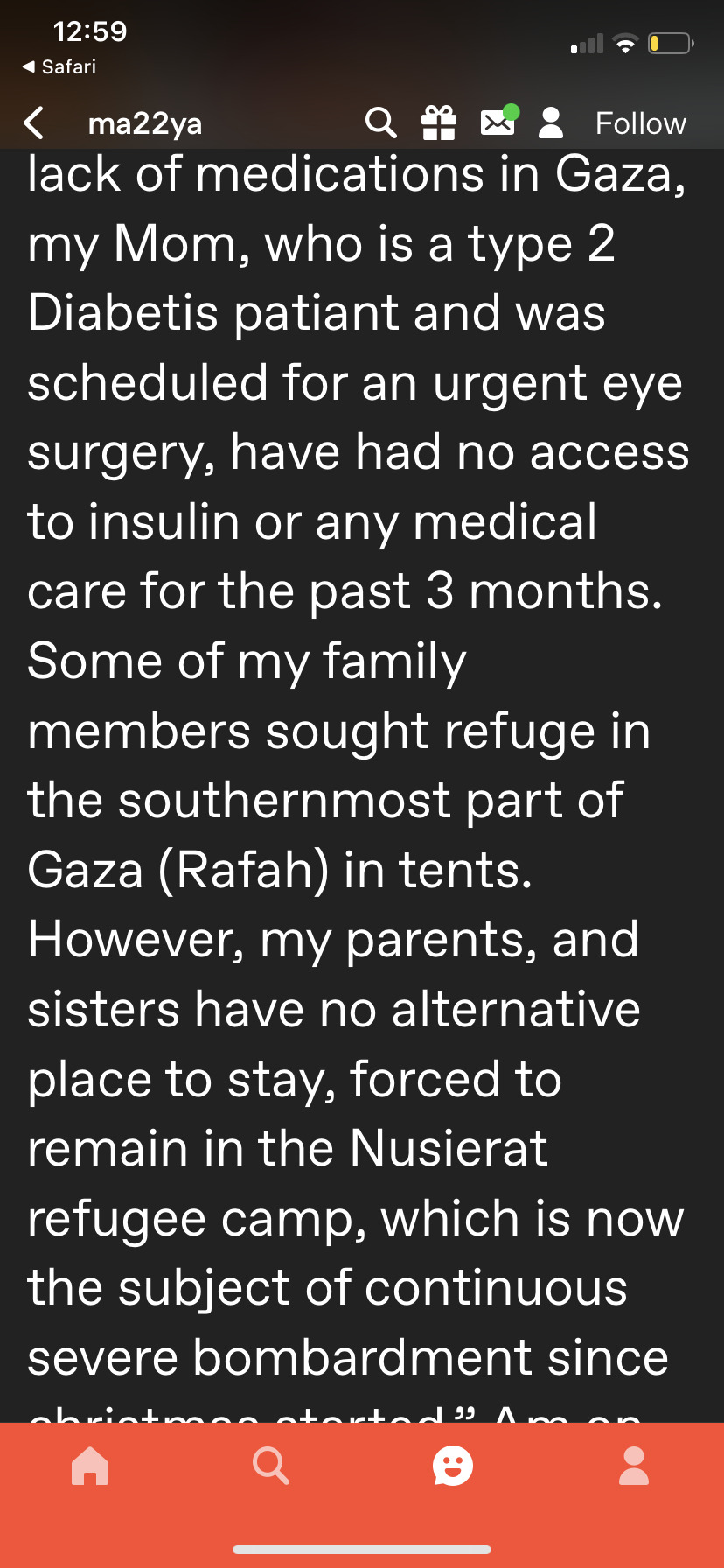

Khalilhan
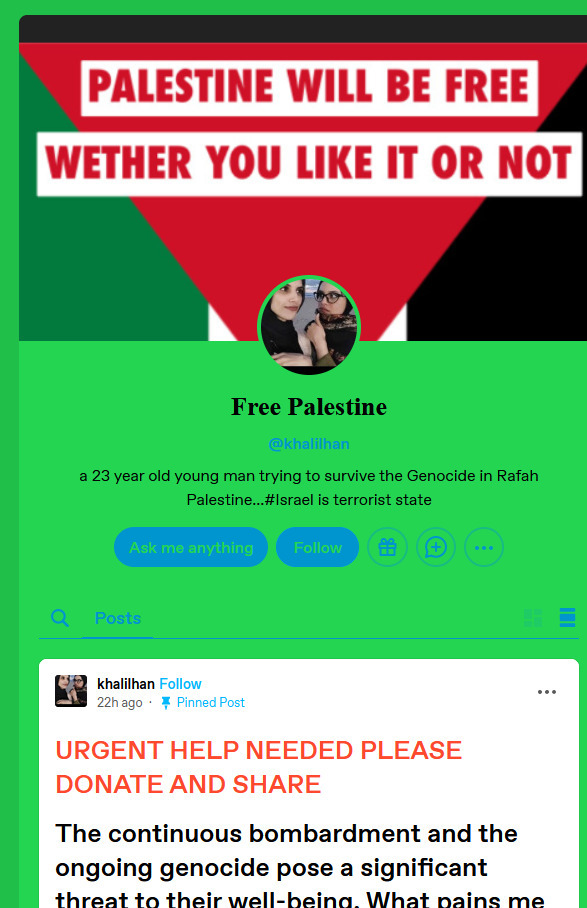

jovialsuitdonutai
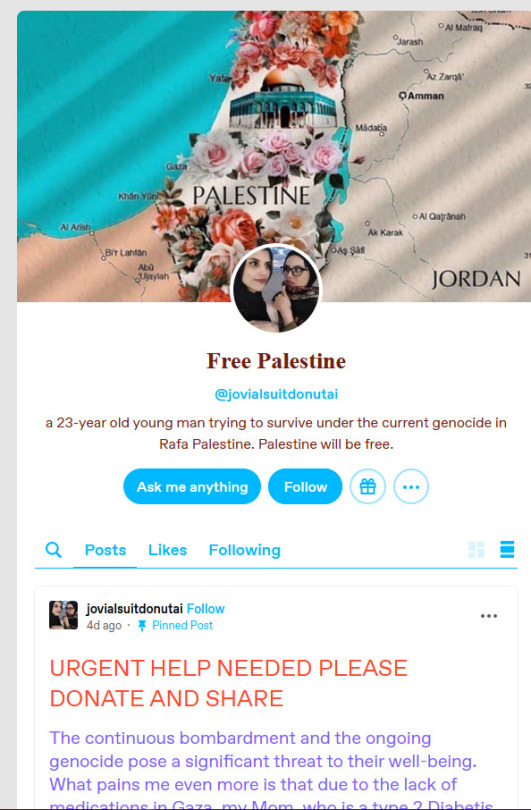

miniaturepostkingjaiur
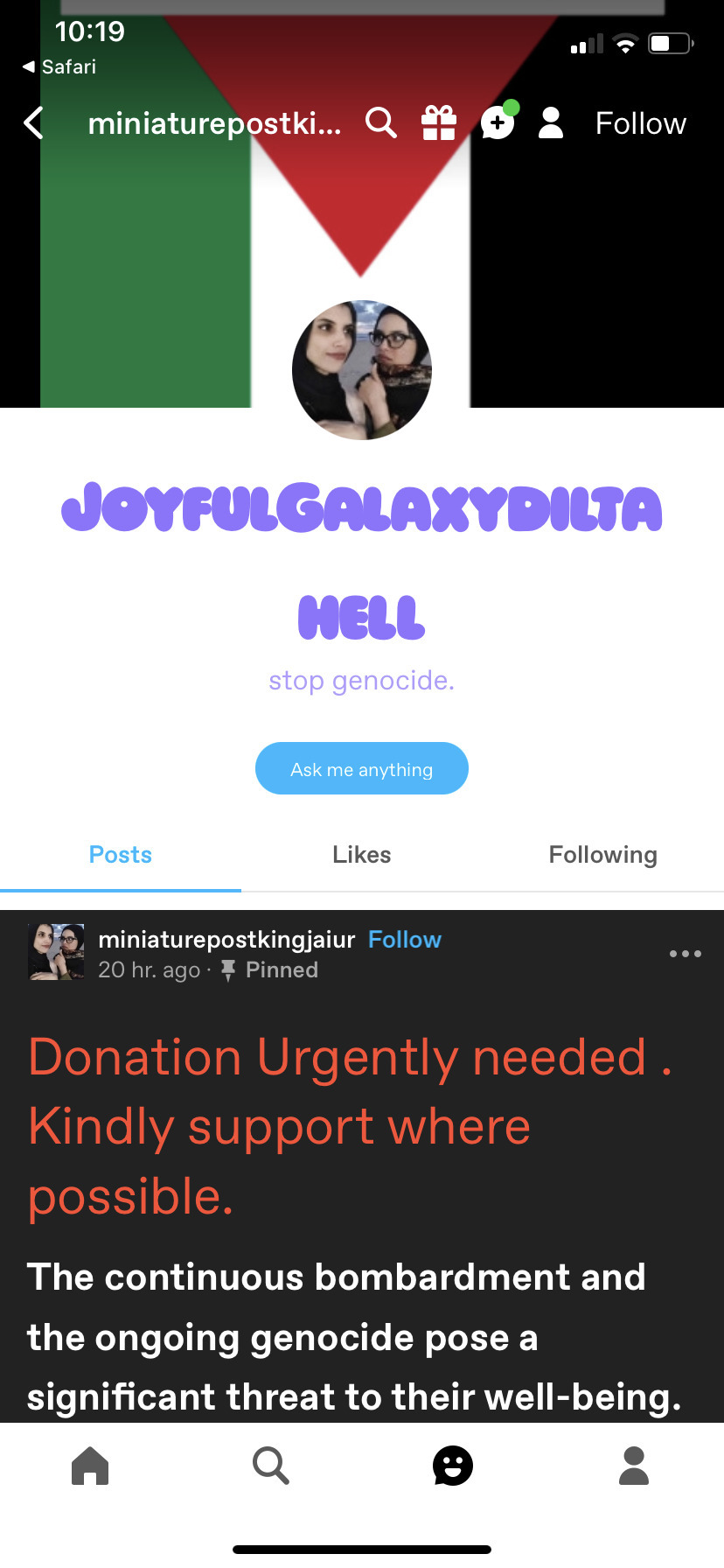
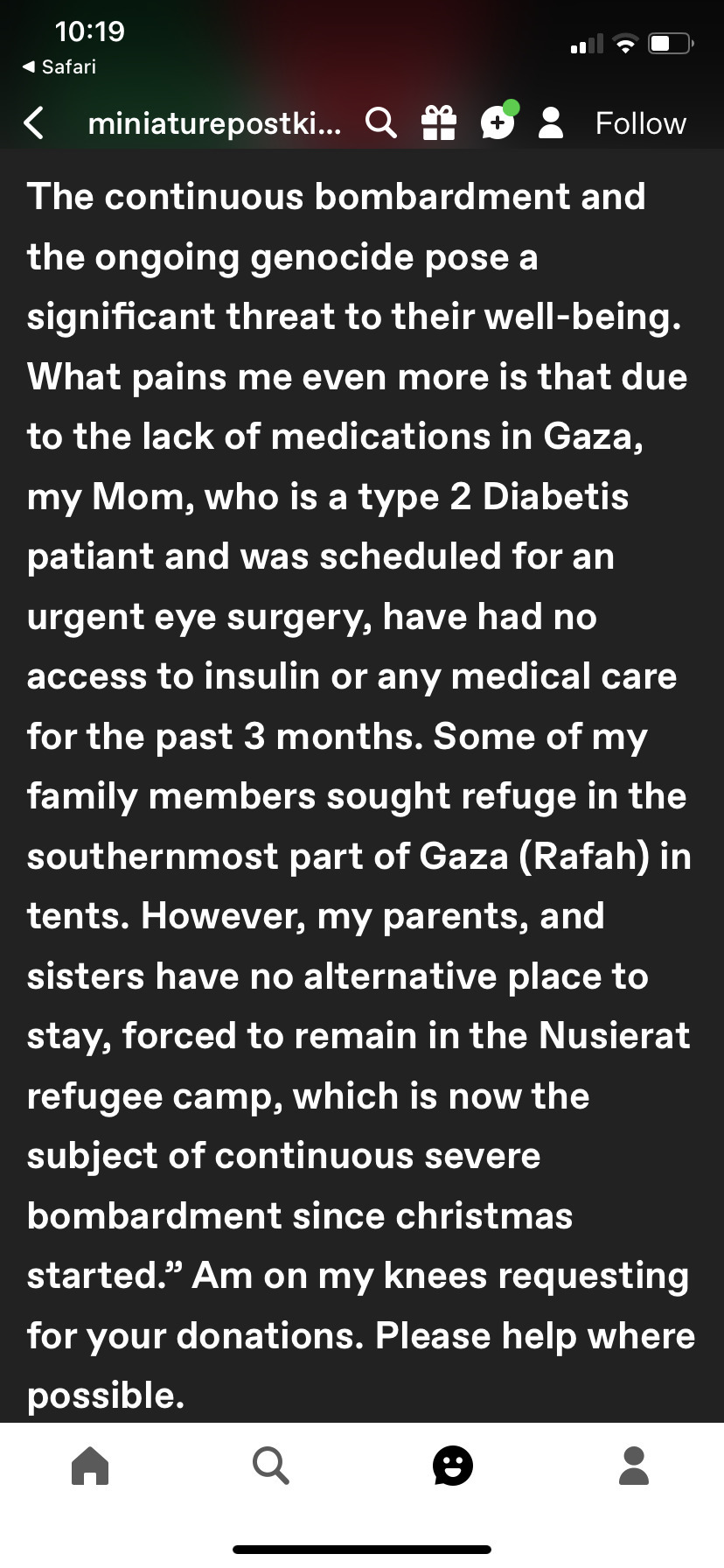
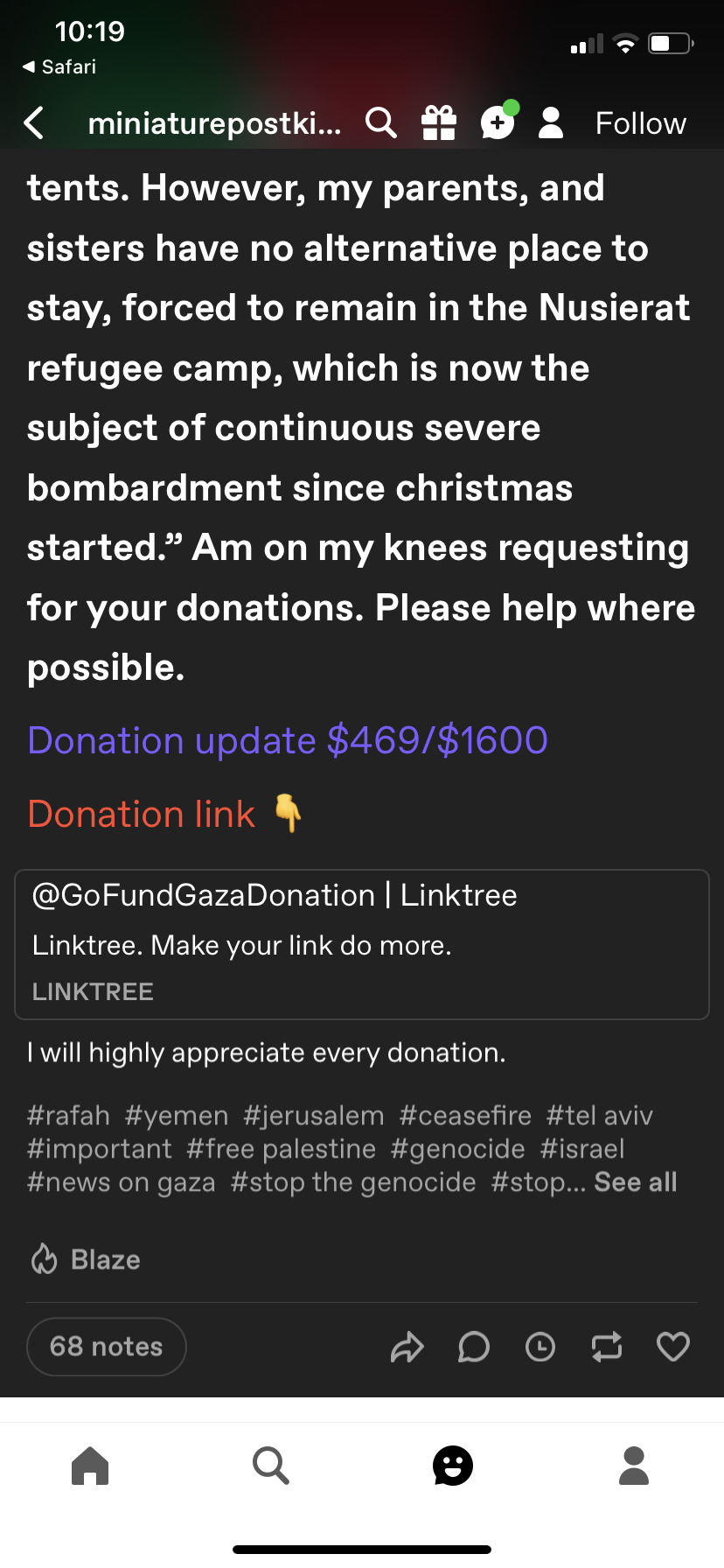
Donation scams on tumblr are extremely common and anyone who has a tumblr account will encounter them at some point. You have likely encountered them before and not realized it. They throw together a brand new blog with a story of needing aid, then use bots to go through follow lists and post notes to send messages to random users. Scambusting blogs like kyra45 do a lot of work to track and call out these scams when they surface.
Scam Spotting Tips
They send an ask often accompanied with a follow despite having never interacted with you before. Ask yourself: How did you find your blog? These interactions usually come out of nowhere when you have no original posts or interests they could've found you through, because they're just going down the lists of random blogs.
They reblog just enough posts to make you think that their blog is in-use when it is actually only a day or a few old. Enable timestamps and try find the blog's oldest post; if a blog seems old but still seems suspicious, be wary of post backdating
They often disable or delete comments on their donation post to hide comments that call them out. Open the notes and see if it says "some replies have been hidden, blocked or removed." Blocked/hidden comments sometimes still appear in reblogs of a post but not the original, so open a random reblog and see if telling comments appear there.
It isn't unusual for the story and the ask to either be exact copy-pastes of each other, or otherwise have very telling suspicious details, such as: using different names, having different goal amounts, contrasting story details, etc. Pay attention to and trust the suspicion of details that stand out as odd.
Like many of the above examples, they often use an automatically generated username consisting of random words
Reverse image searching can be a helpful giveaway if it works, but don't trust it entirely - scammers often steal images from private Facebook groups/profiles or alter the images so that people don't find the source. An image not having a source should also be suspicious, as you should wonder why this person's social media presence is exclusively a 3 day old tumblr blog
When you receive an ask from a blog like this, reporting them for spam or phishing and reporting the PayPal account for fraudulent activity does help get these accounts taken down.
In name of the situation, here are great verified resources to support real people who need help:
Many organizations and gofundmes for Gaza
Verified fundraisers for individuals in Gaza put together by @palestineasdiqa on Instagram and Twitter
Click to donate for free using ad revenue
Participation and political resources for US, UK and Canada
USPCR's toolkit
6K notes
·
View notes
Text
One thing I love about orv is that it initially bait and switches you by convincing you early on that the constellations are the "big bad" of the story - voyeuristic beings that gain enjoyment off the suffering of others - until the reveal that they are also going through their own scenarios. This mirrors how us as the readers are going through our own lives and our own struggles yet we consume media highlighting the experiences of others. We root for these characters, we follow their journeys, we see ourselves in them. And yet we're not villains - we're just surviving. We're escaping the struggles of our own lives by indulging in these worlds created by human imagination. Similarly, many of the constellations in orv do not have malicious intentions despite living off stories - uriel cares greatly for the incarnations she supports (as the "fangirl" archetype) and sun wukong and abfd also greatly support kimcom throughout their journey.
This is further solidified in the reveal of the oldest dream. Despite unintentionally creating worldlines through his imagination, the younger kim dokja was never a villain or "monster". He was simply a child who sook to escape the tragedies of his life through a webnovel. He depended on that novel to survive. And that was in no way the sin he thought it was - not even secretive plotter who had gone through countless regressions and witnessed the despair of the universe could hold it against him. Nor han sooyoung, nor yoo joonghyuk of the 1864th round, nor yoo sangah, nor anyone else in kimcom. No one thought dokja needed to atone for anything - they loved him and cared for him even when he couldn't love himself.
Just like kim dokja and just like the constellations, we are readers seeking an escape from the struggles of reality. And we too are loved - regardless of whether we know it or understand why.
#orv#omniscient reader's viewpoint#orv spoilers#kim dokja#yoo joonghyuk#secretive plotter#kim dokja's company#omniscient reader's viewpoint spoilers#oldest dream#most ancient dream#uriel orv#orv constellations#this novel makes me violently ill
2K notes
·
View notes
Text
Ruler of the 9th through the houses
The 9th house is expansion, belief, wisdom, and the journey of becoming. When you trace the ruler of the 9th house through the chart, you find your unique source of growth, truth, spiritual path, worldview, and even how life calls you beyond your comfort zone. “Where does life want to grow me up? “How do I seek purpose, higher truth, or a bigger story?”
9th House Ruler in the 1st House
Your whole life is a quest for meaning.
You embody the philosopher vibe. Travel, learning, and spiritual experiences shape your identity. People may see you as wise beyond your years — or a natural guide/teacher. You expand through: Personal experience, self-expression, walking your truth. Thinking you have all the answers is your shadow side. “I am the journey.”
9th House Ruler in the 2nd House
You want truth you can touch.
Your values and beliefs are deeply tied — you don’t just talk the talk, you live it. You may be drawn to spiritual or educational paths that offer material grounding or security. You expand through: Building, earning, practicing what you preach. Limiting beliefs about worth or abundance can be an issue. “What I believe shapes what I receive.”
9th House Ruler in the 3rd House
You’re a translator of wisdom.
You take big ideas and make them digestible. You learn and teach through conversation, writing, and sharing. You’re curious and constantly expanding your mind. You expand through: Language, storytelling, community dialogue. Can have Scattered thinking or dogmatic opinions. “Truth lives in everyday conversations.”
9th House Ruler in the 4th House
Home is a spiritual journey.
Your roots, ancestors, and emotional patterns shape your beliefs. You may have grown up with strong cultural or religious influences — or find personal expansion through inner emotional work. You expand through: Emotional safety, healing the past, honoring your lineage. Clinging to inherited belief systems is something to let go of! “My truth begins at home.”
9th House Ruler in the 5th House
Your joy is your philosophy.
You believe in creative self-expression, love, and the magic of play. Romance, art, and fun may open your mind and heart to deeper truth. You’re here to teach through your passions. You expand through: Love, art, performance, romantic adventure. Needing attention or validation for your ideas can be frequent.“I believe in joy as a sacred act.”
9th House Ruler in the 6th House
You live your truth through service.
You integrate your beliefs into your daily life. Spirituality isn’t abstract to you — it’s in your routines, your work, your rituals. You may be called to healing or service professions. You expand through: Practical action, consistency, showing up. Can be prone to Self-sacrificing or rigid thinking around “doing it right”. “Every day is sacred when done with purpose.”
9th House Ruler in the 7th House
Relationships are your gateway to growth.
You attract partners who expand your mind or worldview — sometimes from different cultures, beliefs, or life paths. One-on-one connection teaches you the most. You expand through: Partnerships, reflection, shared beliefs. Giving power to others’ philosophies. “Our connection teaches me who I am.”
9th House Ruler in the 8th House
Your beliefs are born from transformation.
You don’t do surface-level spirituality — you want depth, truth, and emotional alchemy. You may explore taboo or mystical paths, and your purpose often rises from personal rebirth. You expand through: Shadow work, intimacy, spiritual death + rebirth. Obsessing over finding the “ultimate truth”. “I go deep to rise higher.”
9th House Ruler in the 9th House
You’re the archetypal seeker.
You were born to explore truth, culture, philosophy, or spirituality in a BIG way. Travel, teaching, publishing, or guiding others may be part of your soul path. You expand through: Faith, freedom, learning, exploring. Arrogance, superiority, or escapism. “Life itself is my university.”
9th House Ruler in the 10th House
Your purpose is to live your truth publicly.
Your beliefs shape your career and legacy. You may be known as a teacher, speaker, guide, or leader in your field. What you stand for is part of your reputation. You expand through: Ambition, impact, visibility. Performing your truth for clout. “My truth is my mission.”
9th House Ruler in the 11th House
You believe in the future.
Your soul seeks expansion through community, causes, and collective vision. You may feel called to progressive movements, teaching groups, or spreading truth via tech or networks. You expand through: Social impact, innovation, collective dreaming. Losing individual belief in groupthink. “My vision isn’t just mine — it’s ours.”
9th House Ruler in the 12th House
Your truth is cosmic.
You’re tapped into divine, mystical, or dream realms. Your beliefs may be hard to articulate — they’re felt more than taught. Spiritual solitude is your sacred teacher. You expand through: Surrender, inner knowing, spiritual devotion. Escaping reality or spiritual bypassing. “I believe in what can’t be seen.”
#astro notes#astrology#birth chart#astro observations#astro community#astrology observations#astrology community#astrology degrees#astroblr#astro#9th house#astrology content#astrology insights#astrologyposts
540 notes
·
View notes
Text
The Pomegranate Plague of Gen Z Poets
First, it was the moon. Then cigarettes. Then, girls by windows, ethereal in their ruin. Now? Pomegranates. (from my substack)
If you’ve spent enough time around poetry circles, you’ve seen it before. The doomed love, the Persephone complex, the vaguely sacrificial undertones. And, of course, the fruit.
The Persephone Myth (The Popular Version)
So you think you know the story: Persephone, wreathed in flowers, is stolen by Hades, dragged screaming into the Underworld. Her mother, Demeter, weeps and starves the earth in protest. Zeus, eventually deciding this is a problem, orders Persephone’s return—but oops, she ate six pomegranate seeds, so now she’s doomed forever.
That’s the version that survives in girl poetry, anyway.
What Promegerants Girls won’t tell you? The actual myth is a mess. There is no single, definitive version—just fragments, scraps stitched together across centuries. And the pomegranate seed detail?
It barely even shows up.

What We Actually Have:
• Persephone’s myth wasn’t even originally Greek. The story of a goddess being dragged into the underworld predates Greek mythology entirely.
• In Mesopotamian myth, Ishtar (Inanna) descends into the underworld to confront Ereshkigal, queen of the dead. She is stripped of her power and trapped, only escaping by offering someone else in her place—a theme that later appears in Persephone’s myth. This suggests Persephone’s story wasn’t a Greek invention but an adaptation of older Near Eastern fertility-death-rebirth cycles.
• Despoina (“the Mistress”) was worshipped before Persephone—and before Hades was even relevant. In older, pre-Olympian cult traditions, Despoina was the actual chthonic goddess of the underworld. She was venerated alongside Demeter and was probably a far more powerful, independent figure before later mythology reduced Persephone to “Hades’ wife.” Despoina’s cult was deliberately secretive, meaning much of her lore is lost—but she was deeply tied to the Eleusinian Mysteries, which were about life, death, and rebirth, not tragic romance.
• Hades wasn’t even a major figure in early versions of the myth. Before he was written in as “the husband,” the underworld was associated more with Gaia (Earth) and Nyx (Night). Hades’ later dominance in the story came as Olympian mythology reshaped older chthonic traditions.
• Persephone was originally Kore (“the Maiden”)—not a tragic heroine, but an archetype of the life-death-rebirth cycle tied to agriculture. She wasn’t a person; she was a function. The whole point was that she disappears, then re-emerges—her personality was secondary to the cosmic process she represented. Only much later did people start treating her as an individual.
• Hesiod’s Theogony (~8th century BCE), one of the oldest Greek texts, barely mentions Persephone. To him, she’s just Hades’ wife, no backstory necessary. This matters because it shows that her abduction wasn’t even a central myth at first—it developed later.
• The Homeric Hymn to Demeter (~7th century BCE) is our earliest and most detailed source. But forget romance—it’s a political nightmare. Hades kidnaps Persephone (the Greek verb used, ἁρπάζω, literally means “to snatch away”—no courtship, no tragic longing). Demeter shuts down the harvest, and Zeus steps in not out of fatherly love, but because no crops mean no sacrifices, and no sacrifices mean starving gods.
The pomegranate? One sentence. Persephone eats something in the Underworld, so she has to stay. That’s it. The number of seeds? Not even mentioned. The whole “I bit into a pomegranate and now I am bound to darkness forever ”dramatics? A complete invention.
• Ovid’s Metamorphoses (~8 CE) is where we finally get the six seeds detail—but Ovid was Roman, writing centuries after the Greek versions had already evolved. His retelling heightens the drama, turning Persephone into a tragic, doomed figure rather than a cosmic force tied to ritual.
• Later Orphic traditions tried to clean it up, recasting Persephone as the mother of Zagreus (a god later merged with Dionysus), tying her to death, rebirth, and mystery cults. At this point, the myth had already spiralled into layers of mysticism.
• Persephone wasn’t always tragic—she became terrifying. The helpless waif image is a modern fabrication. The ancient sources tell a different story—one where Persephone is feared, not mourned.
• In Euripides’ Helen (412 BCE), she is invoked as a vengeful queen of the dead.
• In Homer’s Odyssey (Book 10), Odysseus fears Persephone’s wrath during his necromantic ritual—she is powerful enough to control the dead without Hades.
• Hecate was Persephone’s underworld counterpart and guide. In later versions, Hecate leads Persephone back to the upper world, further reinforcing Hecate’s enduring role in the chthonic realm.
• In Roman tradition, Proserpina (Persephone) was linked to Libera, a goddess of wild fertility and ecstatic rites. This completely contradicts the modern image of her as a fragile, tragic figure.

The Pomegranate Wasn’t Inherently Tragic
• In Hippocratic medical texts, pomegranate juice was used for contraception and abortion remedies—a practical, everyday association, not one of doom.
• In Pliny the Elder’s Natural History (1st century CE), pomegranates were used to treat fevers and digestive issues. No poetic suffering, just ancient medicine.
• In Greek funerary practices, pomegranates symbolised rebirth, not entrapment. They weren’t about being bound to darkness forever—they were about the cycle of life continuing.
Why This Completely Destroys the Promegerants Version of Persephone
1. The myth is about agriculture and divine power, not doomed love. The earliest versions barely mention Hades—this was Demeter’s story, a myth about the life cycle, cosmic balance, and the survival of humanity.
2. Persephone wasn’t always Persephone. She was Kore, an agricultural symbol, not a tragic heroine. Her function came first, her personality second. The idea of her as a fully realised, suffering individual came centuries later.
3. She wasn’t even the first queen of the underworld. Despoina was worshipped before her—an older, more powerful chthonic goddess with nothing to do with victimhood or romance.
4. The pomegranate was never central to the original myth. It’s a tiny, passing detail used as an explanation for why Persephone had to stay in the Underworld. The number of seeds? A Roman invention.
5. The whole myth wasn’t even Greek to begin with. It likely evolved from Mesopotamian myths like Ishtar’s descent, meaning the Promegerants version is a distortion of a distortion.
6. Persephone wasn’t a victim—she was a force of nature. The later versions of her myth don’t show her as tragic—they show her as terrifying. She was a queen who ruled the dead, feared even by heroes. If Promegerants Girls really wanted to stay true to the myth, they wouldn’t write about Persephone tragically eating seeds—they’d write about her punishing mortals for disturbing the dead.
From Chthonic Queen to Tragic Girlcore
The Promegerants version of Persephone strips her of her original role and reduces her to an aesthetic prop. In the oldest sources, she isn’t even a person—she’s a cosmic force, an idea before she’s a character.
Persephone was never just a tragic girl in a dark room with red-stained lips. She was a goddess of cycles, a ritual figure whose presence dictated the survival of humanity. The oldest myths barely even cared about her personal emotions—because that wasn’t the point.
And the pomegranate? Once a symbol of fertility and power, now just a moody Tumblr metaphor for doomed relationships. Would the ancient Greeks recognize Promegerants Persephone?
Absolutely not.
They’d probably assume she was some mediocre Roman poet’s overdramatic rewrite.
In other words: the version we cling to is a late, Romanized, overly romanticised distortion of a much darker and weirder myth—one that was never about love, tragedy, or women choosing their suffering.

Why Has This Myth Been Hijacked?
Because it’s too easy. The modern interpretation lets poets turn Persephone into:
• A stolen innocence narrative—without engaging with its actual horror.
• A tragic queen figure—without ever giving her power.
• A martyr for womanhood—as if eating a fruit were some grand metaphor for the inevitability of suffering.
But Persephone’s story was never about being loved and ruined.
It was about bargaining, power, and gods who don’t care about human grief.
The Pomegranate Problem™
At this point, the pomegranate isn’t a symbol—it’s a decorative prop.
Its original meanings—fertility, power, the tension between life and death—have been stripped away, replaced with moody girlhood aesthetics.
Poets don’t use it because they understand its history. They use it because it sounds expensive—like a fruit for people who romanticise heartbreak in foreign cities.
But if your poem still works after swapping “pomegranate” for “grapes”, then what are we even doing here?

Read This Before You Write Another Pomegranate Poem
• Homer’s Odyssey → Pomegranates appear in King Alcinous’ eternal orchard, a symbol of wealth, abundance, and divine favour. Not doom.
• Euripides’ Ion → Associated with Aphrodite, symbolising fertility, passion, and desire. Again—not doom.
• Aristophanes’ Lysistrata → Used as an innuendo for female sexuality (which, frankly, would make for a far more interesting poem).
• Dionysian Mysteries → Linked to ecstatic rites, resurrection cults, and the cycle of life and death. If you want to write about pomegranates and darkness, this would actually make sense.
• Roman Religion → Sacred to Juno, particularly in marriage and childbirth rituals, reinforcing their connection to fertility and renewal, not suffering.
• Theophrastus’ Enquiry into Plants → Describes pomegranates as a cultivated luxury fruit, prized for its sweetness, medicinal properties, and status.
• Herodotus’ Histories → Mentions Persian warriors decorating their spears with pomegranates, symbolising strength, fertility, and victory.
• Pausanias’ Description of Greece → Describes pomegranate offerings at Demeter’s sanctuaries, representing fertility, rebirth, and ritual purification—never suffering.
• Plutarch’s Moralia → Links pomegranates to beauty, sensuality, and indulgence in Greek and Roman culture—so, more hedonistic pleasure, less tragic metaphor.
Next time someone writes about a pomegranate-stained mouth, ask them if they mean Persephone or Aristophanes’ sex jokes.
How to Write a Pomegranate Poem That Survives Scrutiny
If you must use it, at least be rigorous. If you’re going full Persephone-core, then be specific. Make it about something real.
Tell us if the juice stains the sheets, if the seeds taste like metal, if they stick between your teeth like regret.
Don’t just drop in “pomegranate” and expect us to do the heavy lifting.
Or consider letting the myth go.
There are so many other symbols, so many richer, underused classical references.

And If You’re Tired of the Pomegranate, Try These Instead
there’s a whole world of classical symbols that carry just as much weight—without the overuse. Here are a few:
Chthonic & Underworld Imagery:
• Asphodel – The ghostly, liminal flowers of the underworld in Greek myth, growing where souls linger. Less overdone than pomegranates, just as eerie.
• Lethe – The river of forgetfulness. Its waters erase memory, a far more unsettling metaphor for loss than a single piece of fruit.
• Orphic Gold Leaves – Real funeral tablets placed with the dead, inscribed with guidance for navigating the afterlife. The ultimate memento mori.
• Owls – Athena’s symbol, but also a nocturnal watcher associated with wisdom, death, and the unknown.
Fertility, Desire & Ruin:
• Fig Trees – Symbolizing sensuality, abundance, and decay (the Greeks also had fig-wood coffins).
• Laurel Wreaths – Victory and poetic ambition, but also a crown of temporary glory—since laurel leaves wither fast.
• Myrrh – A resin used for perfume and burial rites, evoking both seduction and decay. (Also linked to Myrrha, who was cursed to fall in love with her own father. Greek myths were wild.)
Dionysian Madness & Ecstasy:
• Thyrsus – A staff tipped with ivy and pinecones, wielded by Dionysus and his followers. Represents intoxication, divine frenzy, and the thin line between revelry and destruction.
• Ivy – Unlike flowers, it never dies in winter. Clings, suffocates, overtakes. A more interesting metaphor for entanglement than Persephone’s six seeds.
If you must use a pomegranate, at least make it bleed. But if you’re ready for something richer—there are so many other symbols waiting.
#malusokay#girlblogging#persephone#pomegranate#poetry#poets on tumblr#writers and poets#poems#poems and poetry#female writers#writing#writers on tumblr#writeblr#writerscommunity#substack#essay#personal essay#essay writing#classic academia#student#classics major#classics#classical literature#classic literature#ancient greek#classical studies#ancient greece#mythology#greek mythology#academia aesthetic
410 notes
·
View notes
Text

In a world where magic is law and power is everything, A thin line between desires invites you into a sinfully beautiful, emotionally charged, wickedly dark and traumatic interactive tale set within Aequrion, a realm that had been split a long time ago into the Mortal and Undying Lands, humans and kindred. Embark on a fast-burn, high-stakes journey of trauma, power, and the thin, blistering line between love and survival. Every decision matters. Every scar tells a story. And the deepest monsters may not be the ones wearing claws.
You play as a human woman with no memories, brought into a world of magic and monstrous beauty — used as a pawn, stolen from the arms of one High Lord by another as prophecies and blessings push you deeper into the fray.
What began as a dream of love and freedom shattered into nearly a decade of decadence, survival, pain, degradation and despair. Once cherished in the wild Forest Court, now kept as a twisted trophy in Regina’s brutal dominion beneath the mountains of the Sun Court.
But even in darkness, desire burns.
Even in chains, your mind remains your own. Mostly.
Reclaim your voice.
Uncover buried truths.
Shape the fate of the realm with every decision.
Will you seek vengeance? Love? Freedom?
Or will you become something else entirely?
Warning: This dark romantasy contains mature themes, emotional intensity, and morally complex characters. Choose carefully. Not every path leads to salvation. Some sexual content is not optional and VERY non-con, in the beginning as the MC is captive (full fairy revel madness).
The romance is not optional, you will have to choose a ✨mate✨ at one point.
This is a WIP and things are subjected to change.
Theme: HEAVILY inspired by ACOTAR (this was initially a Tamlin redemption fanfic that spiraled out of control ) With sprinkles of WoT and Stormlight Archive.

Your story is one of choices, of pain and power, of twisted affections and fragile alliances. Who can be trusted in a world where pleasure is weaponized and loyalty is a mask? Who are you when survival turns to something more?
-> MC is gender-locked as female, but every other aspect is customizable (the usual skin and eye color, hair color, texture, length, etc.).
-> Choose a body type from Slender, Curvy, Toned.
-> Options for body image and a favorite feature characters will comment on.
-> Play as one of 4 female archetypes: The Maiden, The Enchantress, The Nurturer, The Wise. These will not lock you out of anything, just give a general idea of how your character usually thinks.
-> Choose from 3 Backgrounds for your past, noting that the amnesia will never go away:
1 betrayed spy
2 escaped cultist
3 "Modern girl falls in a fantasy world" - this one will have mc as an entirely new character into the world with no secret ties to anything. It’s all up to you to canon.
-> Survive a scorned rejected female on a warpath, forge alliances, escape your first assassination, bond a dragon, live through a war, forge a Fellowship and journey on a mission to save the world or break it.

Not all love stories end the same — some are about mending, some about letting go, and some about remaking the world.
🍃 Kael’thalas - High Lord of the Forest Court - The Wild Sovereign - The Last Ael’thari
The High Lord of the Forest Court is the embodiment of untamed nature and quiet strength. Towering and broad-shouldered, his body is carved from muscle, like an ancient statue grown from the earth itself. His skin is sun-kissed, and his long, almost-white blonde hair falls in silken waves down his back, often tangled by wind and wildflowers alike. Beneath heavy brows, his emerald green eyes shine with a soul-deep warmth—piercing, yes, but never cold.
There’s a primal grace to him, like a great beast at rest, power held in patient reserve. Tattoos or markings snake down one arm, looking like roots or vines grown into his skin, echoing his bond with the forest. Though he looks wild, there’s a gentleness in the way he moves, in the way his gaze lingers—protective, steady, and deeply in tune with the world around him. A quiet force of nature cloaked in silence and strength, the very air shifting around him… and the first face you see when you awaken.
Tropes: Found family, friends to lovers, Star-crossed lovers?, option for him to be just a brotherly figure.
🌙 Azrien - High Lord of the Moon Court - The Fallen Star - The Moonkindler.
The High Lord of the Moon Court is a vision born of midnight and magic. His skin is twilight, velvety lilac to deep blues, scattered with constellations that shimmer and shift as if the night sky itself had been woven into his flesh. Each movement catches the light of invisible stars, casting soft glows that dance like stardust. His long, silvery-white hair flows around him like lunar mist, wild and otherworldly. It floats with a weightlessness that defies gravity, haloing a face both sharp and regal. His silver eyes glow like twin moons, unreadable and eternal, always watching with a calm that borders on eerie. There’s an elegant stillness about him, a silence that commands reverence.
Adorned in regal black and cosmic violet, inked with celestial patterns across his chest and shoulders, he is timeless—a being shaped by both shadow and starlight… and your kidnapper, the one responsible for your decade of misery and despair.
Tropes: Arranged marriage, the most enemies to lovers, with a dash some kind of shared Stockholm syndrome for sure :)), Star-crossed lovers?
☀️ Solren - High Lord of the Sun Court - The Gilded Flame - The Sun's Judgement -> I am weak, I might turn him into some kind of twisted Sunwalker vampire
The High Lord of the Sun Court stands as a vision of elemental fire and divine authority. His skin is bronzed and radiant, glowing faintly with the burnished warmth of eternal sunlight. Golden tattoos arc across his chest and neck like ancient runes, pulsing softly with power. Long, fiery red hair falls in wild waves or perhaps a loose braid, a cascade of molten flame framing a face carved with impossible beauty—sharp cheekbones, full lips, and glowing amber eyes that burn like twin suns.
There’s a dangerous allure to his gaze, something both regal and ruthless, and the faint smirk tugging at his mouth speaks of a male who knows both power and how to wield it. But why has such a creature turned his eyes on you?
Tropes: Oh man… manipulation? enemies-ish to lovers.
🔥 Orin - Heir of the Sun Court - The Second Sun - The Tempered Spark
The Sun Court Heir is a prince draped in gold but shadowed by doubt. Though he sits in silks of cobalt and sun-burnished bronze, his presence is tempered by the ache of never being quite enough. A second son, a “spare”, only heir due to his runaway sister, he bears only one undeniable inheritance from his father—their burning, golden eyes, bright and watchful like the desert sun at its zenith.
His features are sharp with restraint, noble yet guarded, a face that learned too young how to mask longing with indifference. His skin is a rich, warm bronze—sun-kissed and dark, like polished mahogany brushed with gold. It glows under the light, a quiet defiance. His sharp cheekbones and long, narrow face give him a regal, almost ethereal look, made all the more intense by the golden eyes that smolder from beneath his dark lashes. His dark, unruly hair falls around him like a storm held at bay, often half-shadowing the glint of his gaze. Around his neck, gold rests heavy—symbols of a court that praises brilliance but rarely kindness.
He is not cruel, only carved from years of being overlooked. Beneath the gold, beneath the practiced poise, is a longing to be seen—for who he is, not who he failed to be. And in his rare, quiet moments, when no one is looking, he turns his golden eyes toward you.
Tropes: a bit of a corruption arc? Manipulation turned obsession?
🎭 Wits - Fellow enslave merman - The Harrowed Fool - The Broken Song
The Jester, known to most as simply Wits, is a figure of both mystery and sorrow — a mad, ancient being bound in silence. His once-haunting voice, said to have been able to tame storms and lure ships to ruin, is long gone. Around his throat lies a heavy iron chain, its weight both physical and symbolic. Beneath it festers an old, unhealed wound, raw and angry, like a cursed reminder of what he once was.
His eyes are the color of the open sea—deep, fathomless, and glimmering with a thousand unspoken tragedies. His hair falls in wet, tangled strands, sometimes adorned with bits of shell or seaweed, like he never quite left the ocean behind. Though his madness often masks it, there is a keen intelligence in his gaze, something sharp and old and watching.
Despite his wild, erratic laughter and eerie presence in Regina’s court, he moves with a fluid grace that betrays his aquatic origins. His smile rarely reaches his eyes. When he dances or mocks, there is always a shadow of pain lingering beneath the performance—a melody unsung, a scream forever trapped behind sealed lips.
Tropes: hmmm yes… spoilers… too big… the spoilers! but still in the realm of fated love.
⚔️ Rhevan - The human King - The Bloodbound King - Oathbreaker.
The Human King is is a legend carved in blood and fire.
His eyes, a rich, earth-dark brown, are deep and steady like tilled soil after rain—patient, knowing, scarred by what they’ve seen. There’s weight in them, the kind that comes not from age, but from choice. He does not flinch from violence, but neither does he revel in it. He carries the cost of his crown behind those eyes.
His body is carved by survival—tall and powerful, yet weathered, with a strength born of necessity, not ornament. His skin is a rich, sun-darkened bronze, marred by old scars and the occasional fresh wound that he wears like history etched in flesh. There’s a brutal honesty to him, as though he would rather be feared than adored—and yet he is loved for that very reason. His hair is a tousled crown deep brown, falling in wild curls that catch the light like dark copper leaves. His jaw is strong, his cheekbones high, and his smile—when it comes as he turns towards you in a dream —is both fierce and unburdened, the kind that feels like summer after a long winter.
Tropes: kinda enemies to something more, loyalty, betrayal, angst, the usual
The routes are somewhat (loosely) paired thematically in groups of 2, but you will not be locked out of anything until the final mate bond… somewhere towards the middle of the game.
Fate vs. Free Will - Kael & Az
Power vs. Compassion - Sol & Orin
Mortality vs. Divinity - Wits & Rev
I am contemplating an unhinged reverse harem route where MC just freaking mates all of them to her :))

FAQ - DEMO - coming soon
177 notes
·
View notes
Text
Astrological Wonder #2: Mrigashira and the Forbidden Fruit Archetype
Background Info: Mrigashira and the experiences of them being chased by something that they know they can't have. I want to talk more about this idea because the people close to me have dealt with this situation. Being in a situation where they are not available in some way, and people get even more "enchanted" by them in the process.
To explain the mythology of Mrigashira, the deity for this nakshatra is Soma (Chandra), who in Hindu astrology was born three times by Brahma, who is the ultimate creator of the universe. Chandra was married to all 27 Dakshas' daughters, which represents the 27 nakshatras, but out of all the wives, Chandra loved Rohini the most. By the jealousy of the other wives, Daksha cursed Chandra, so Chandra's light began to dim and creating a waning moon. Mrigrashira also represents the deer head, which in the mythology of Brahma(who in some older Vedic texts is called Prajapati), the creator of the ultimate creation of the universe. Brahma loved the creation of beautiful things, and due to no population being created yet, he disgustingly tried to fornicate with his daughter Rohini for immortality. To escape her father, she turned into a deer and ran away. This story is very similar to the French story of Peau d'Âne, where a daughter wore donkey skin to run away from her father due to him wanting to marry her. Soma is also known for its tantalizing effects due to being the nectar of immortality (which was why Brahma wanted to fornicate with his daughter) and ecstasy, providing pleasurable and medicinal properties.
Deers are often symbolized for innocence, but also victimization due to deer being a natural prey within the animal kingdom (poor deers). However, I also want to mention that Mrigashira is a serpent yoni nakshatra (yoni types describe sexual/spiritual archetypes; serpent yonis are intuitive, sensual, and magnetic). In the texts of the Bible, the serpent convinces Eve to eat the fruit, taking a chance for her to break the rules that God had given to both Adam and Eve, representing the voice of tempation (Rohini also has a sepernt yoni as well but the themes surrounding the forbidden fruit for this Nakshatra are a bit different from Mrigashira). In Hindu texts, serpents are also associated with Kundalini, which are the powerful force of the divine energy that guides one to spiritual liberation.
Claire Nakti mentioned in her old and deleted post of Mars nakshatras that when women reach past that stage of playful sexual energy and into the stages of divine womanhood, Martian women are more appealing than Mercurial. Martian women are also depicted as strong forces, whether they are bullies of another, or at that "awkward" stage of life until they embrace their totality, or fully reject outside influences and are okay with being an outsider. Martian women are okay with showing their bodies, uplifting women to care for themselves, and to focus on themselves, as Martian women who naturally embody masculine traits are not afraid of what others think of them due to that expansive heat filled energy (especially using the heatful energy to open up those who are naturally closed ahem ASHLESHAS).
Lastly, Mrigashira nakshatra is the deva gana and within the mridu nakshatras. Mridu nakshatras are known for their tenderness and gentleness as well, mostly focusing on relationships and creative pleasures. Deva gana are also known for their humble nature, morality, and thoughtfulness of others. I think due to Mrigashira being within softer categories (@invenusworld mentioned this as well), people do not take Mrigashira's words seriously when they put their foot down. Although it's a Mars nakshatra and they do have the ability to be externally corrosive and internally pleasant, I think Dhansishtas and Chitra's have a bit more issues dealing with those who consider them to be "problematic" and such rather than Mrigashira (although it's still there with Mrigashira individuals just towards a smaller degree), due to that gentle nature of them.
Let me provide some examples!
The Greatest Showman
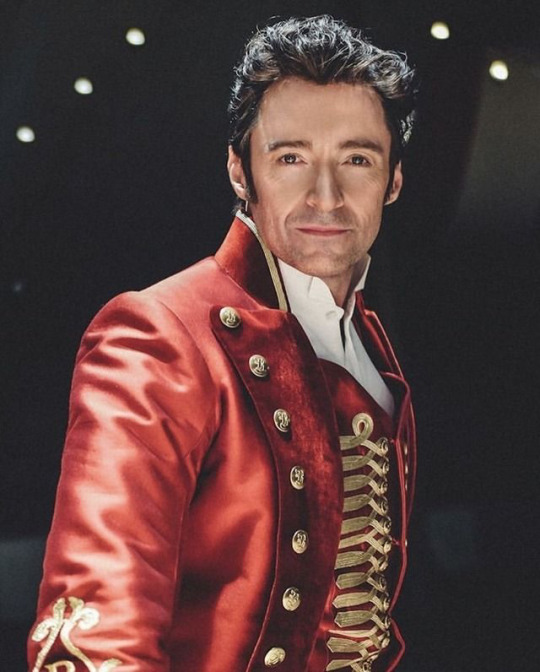
Hugh Jackman (Mrigashira moon): I know that I mainly wanted to focus on this with women but I thought this would be a good example. In the movie The Greatest Showman, in the same fraction of the film, due to his being too invested in his work, he started to work with Jenny Lind. Jenny started to have a crush on him, and I think she even tried to kiss him in the movie, knowing he was married💀
Moulin Rouge
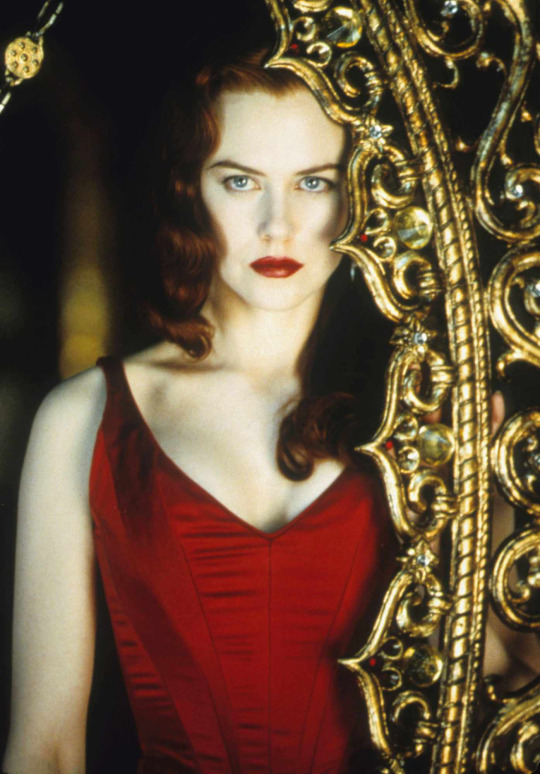
Nicole Kidman (Mrigashira Sun): In Moulin Rouge, Satine is being chased by the Duke, who wants to have sex with her in exchange for converting the club to a theater. The Duke tries to force Satine to fall in love with him, but Christian (an actor) catches Satine's heart before the Duke, causing him to rage and work in cohorts with Zidler to stop Satine and Christian's love affair.
Mother!
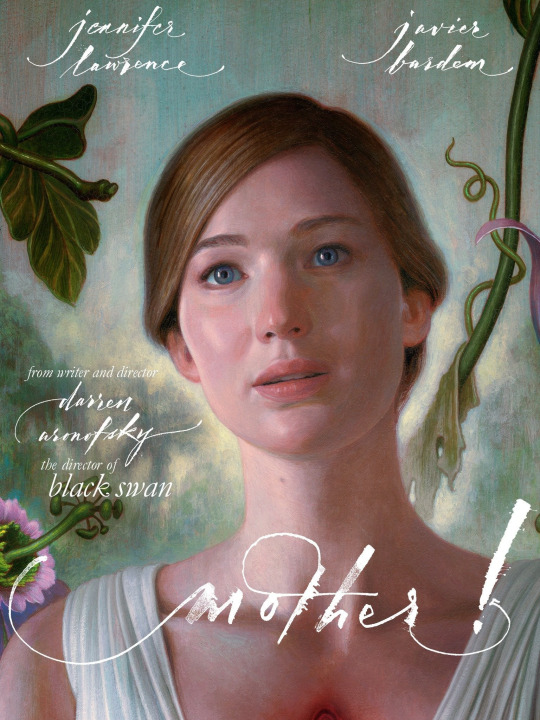
Jennifer Lawrence (Mrigashira Moon): In the movie, people take advantage of her kindness, and she constantly tries to put her foot down, but people still take advantage of her. Darren Aronofsky, the creator of this film, wanted to create this movie to depict how humanity acts towards Mother Nature (Mother) and God (her husband) in the film. In the biblical sense, people take and take what they can't have and took from Mother until she raged and ended herself in the process.
Avatar
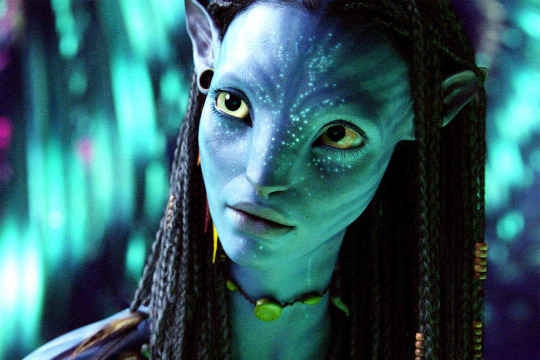
Zoe Saldana (Mrigashira Sun): A White man who invaded her planet and fell in love with her in the process when he knew shouldn’t have😭
Astrological Wonder: With this research, I wonder if Mrigashiras are seen as the forbidden fruit archetype, similarly to the Phalgunis, due to the deer symbolism and the story being Mrigashira. Mrigashira's are often depicted as those who are stalked, on the run, and being preyed upon other people and I wonder if it is due to those seeing Mrigashira as something to "conquer" (especially with the themes of the deer as deers are not only hunted by other animals but by humans too). Mrigashira reminds me of the apple that people want to eat but know they shouldn't.
I hope my post made sense LOL. Please feel free to let me know what you think!!
217 notes
·
View notes
Text
Natal-Synastry Astrology: Bad, Terrible & Abusive Moms Aspects & Placements “ My Mom & Me Do Not Get Along”


Not every person’s mother feels like home. For some, their mother feels like pain—a pain that lingers in the background of their lives, sometimes subconscious, sometimes painfully present, following them to the end of time.
Motherhood is a great responsibility. Some rise to the occasion, aligning with the sacred essence of it. And some fall—so far from embodying motherhood that they abandon, neglect, or berate their children enough to let them know they were never wanted in the first place.
Motherhood walks a thin line: between raising a soul and drowning one. Yet many mothers do not realize the unique and terrifying power they hold—until it has been wielded in the worst of ways.
In today’s post, we’re not talking about the nurturing, loving, beautiful mothers. We’re not talking about the ones we love to visit—just to taste their food, or to sit beside and feel the warmth of their comfort. Not the mothers who affirm us, who pour endlessly into us, who teach us how to love ourselves by the way they loved us.
Not the mothers we hope to become. We’re talking about the other kind. We’re talking about the wicked. The mothers we see on the news, in tragic stories—where love has been lost, or maybe was never there to begin with. We’re talking about the mothers who are neglectful. The ones who abandon their children to chase highs, dopamine, escape—anything outside of the very soul they brought into this world.
We’re talking about mothers who cannot nurture. Mothers who are distant. Cold. Who turn love into a transaction, a duty, a courtroom. Mothers who become judges instead of protectors. Not the ones who bake cookies and gather the family. But the ones who can’t even make their child a sandwich. Who won’t lift a hand to bathe their child.
We’re talking about mothers who make you feel uneasy. Who make you wonder if motherhood is something learned or something innate. We’re talking about the mothers who cause your heart to drop when you’re near them. The kind you pass in public, watching them with their child, and something inside you whispers: That child isn’t safe. We’re talking about the mothers who made you bleed before you ever had your first wound.
Today, we’re talking about the mothers who abandoned the sacred essence of the Mother archetype—and left us wondering: Why is humanity sometimes so cruel?
Pluto in the 4th House
This placement often points to a mother who was deeply wounded in childhood—someone who experienced profound trauma, emotional darkness, and dysfunction. As a parent, she hasn’t transformed or healed from that early pain, so she ends up projecting it onto her children. With Pluto in the fourth house, she may be the dominant figure in the household—controlling every aspect of the environment, including her child.
She may manipulate, dominate, and struggle to relate emotionally to her child. As the child grows older and begins to seek autonomy, she tightens her grip, becoming even more controlling. When control no longer works directly, she resorts to covert manipulation—setting traps so the child remains under her thumb.
She may be hypervigilant, offering no privacy or personal space. She invades boundaries, needing to know every detail about her child—even the things that are meant to be private. Psychological tactics become a weapon: gaslighting the child about past harms, sabotaging friendships, or isolating them from supportive people.
Moon Square Pluto
This mother feels deeply but lacks the tools to process or regulate her emotional intensity. She’s endured immense pain—trauma, betrayal, depression—and because of that, she struggles to connect with her child emotionally. Instead of learning how to parent from a healed place, she demands that her child carry emotional intelligence far beyond their years.
She burdens the child with responsibilities that should never belong to a child. She expects the child to be calm because she cannot be. She expects the child to nurture her because she cannot nurture. This emotional role reversal causes resentment, and that resentment activates her darker tendencies.
Moon square Pluto mothers crave control over their intimate environment, but their way of asserting control is unhealthy—possessive, vindictive, and manipulative. They may never raise a hand, but their words are weapons. Verbal abuse, threats, and emotional sabotage become tools to keep their child close and emotionally dependent.
They may hinder the child’s growth by planting psychological roadblocks—ensuring the child never surpasses them. If they’re miserable, they want the child to remain miserable too. Emotional warfare is their language. Even when they give, it’s conditional—just enough to keep the child bound, never enough to feel loved.
Outwardly, they may appear to be “good mothers.” Behind closed doors, they are emotionally tyrannical.
Venus Square Saturn
This is the emotionally barren, narcissistic mother. She doesn’t love freely or unconditionally; she sees the child as an extension of herself—useful only for admiration or boosting her ego. But no amount of validation ever satisfies her; it only inflates a fragile sense of self.
This mother is cold, distant. When the child needs emotional support, she’s “too busy.” She makes love something to be earned—not something she gives willingly. If the child wants kindness, affection, or attention, they must perform for it.
She is strict, rigid, and image-obsessed. When the child succeeds, she shows them off. When they don’t meet her expectations, she shames or erases them. She may gossip about her child, reveal private things they confided in her, and smear their reputation.
She struggles with physical affection—hugs, kisses, nurturing gestures. Instead, she criticizes relentlessly: their appearance, weight, choices, friendships, ambitions. Nothing is ever good enough. Even success is met with backhanded compliments or undermining remarks.
This is the kind of mother who cuts deep without touching you—through coldness, shame, and constant disapproval.
Mars in the 4th House
This mother is a storm—either living in the chaos of domestic violence or bringing that volatility herself. The home is never at peace. She may be constantly yelling, exploding with anger, or emotionally abusive. If she’s in toxic relationships, the children absorb the emotional debris.
She might not hit, but her words are cutting, cruel, and aggressive. Or she may be reckless—making impulsive decisions that destabilize the household, like losing electricity, moving without notice, or leaving the kids with unsafe people.
You try to talk, but she only argues. You try to connect, but she lashes out. She is emotionally unreachable—always in a battle, whether with you or the world. If she’s a workaholic, she brings the stress of her career into the home, leaving no room for softness or nurture.
Mars in the 4th can also reflect a single mother hardened by survival. But instead of channeling that into protection, she turns her resentment onto her children. She can be masculine in her demeanor, volatile in her reactions, and sometimes physically abusive.
Lilith in the 4th House
This is the mother who rejects traditional motherhood altogether. She doesn’t see nurturing as sacred, and often feels that her freedom matters more than her children’s emotional needs. Her identity is rooted in rebellion and defiance.
She might live a double life—engaged in sex work, hidden professions, or scandalous lifestyles. The home becomes a stage for secrecy and shame. Her children may not even know what she does for work.
She may engage in polyamorous or nontraditional relationships, prioritize pleasure and chaos over stability, and spend more time with lovers than with her children. Often, her kids are raised by grandparents or left to fend for themselves.
There’s also the possibility of her being in and out of jail, dealing with addiction, or enmeshed in criminal activity. She may be pimped out or involved in dark industries. Sometimes, this placement also speaks to fame or celebrity status—where the mother is always absent, and nannies fill the void.
Whatever the scenario, the child grows up with emotional abandonment and deep confusion about who their mother truly is.
Moon Conjunct Saturn
This is the emotionally unavailable, transactional mother. She believes that providing basic needs is enough—that feeding you, housing you, and taking you on occasional trips should fulfill her duty. She doesn’t understand emotional presence.
If she gives to you, she reminds you of it constantly. Love and support come with a price. You always feel indebted to her. If she helps you, she expects something in return. Every interaction feels like a business transaction, not maternal care.m
When you cry, she stiffens. She can’t hold space for your emotions. She stays, but it’s a cold presence—you’re never quite sure if you’re truly loved.
She may have been extremely strict—punishing minor mistakes with disproportionate consequences. Even in adulthood, she criticizes your choices and restricts your freedom.
She doesn’t believe in you. She doesn’t see you. And no matter what you do, it never feels like enough.
Chiron in the 4th House
This is the kind of mother who comes from a broken household. Her upbringing was shaped by trauma, dysfunction, and abandonment. She may have grown up in foster care, been left behind by her parents, or been raised by someone struggling with addiction, sex work, or the darker elements of life. Her childhood home—if she had one—was not safe. It was a place of pain, chaos, or complete absence.
Because of this, when she becomes a mother, she doesn’t know how to nurture. She doesn’t know how to offer love, provide stability, or show up emotionally. She’s deeply wounded, and without healing, she projects those wounds onto her children.
She didn’t feel loved as a child, so her children grow up feeling unloved. She didn’t feel protected, so she struggles to protect them. She never experienced emotional stability, so her home becomes unstable, mirroring the chaos she knew.
She hasn’t healed from her trauma, and so she passes it down. If she grew up abandoned, she becomes emotionally unavailable. Slowly, she begins to detach. She throws herself into work or distractions, until one day, she’s no longer present at all.
The child grows up with an ache—feeling abandoned, unloved, and unseen—not because the mother wanted to cause harm, but because she never learned how to give what she herself was never given. In the end, this is the wounded mother: one who projects her pain, fails to nurture, and unintentionally recreates the very harm that shaped her.
Mars Square Uranus
This is the emotionally volatile mother—the one whose instability throws her children into a constant state of survival. She rarely thinks before she acts. One chaotic decision leads to another, and her children are swept up in the consequences.
She places them in dangerous or abusive environments, not out of malice, but recklessness. She uproots her life without considering the impact. She lives by impulse, not reflection. Her desires come first, and her children are dragged along for the ride.
This mother thrives in drama. She might move frequently—from city to city, or even country to country—with no clear reason or plan. She might suddenly disappear, or end up in jail. There are moments when she seems calm, but they’re brief. Beneath the surface, there’s always aggression.
She has explosive episodes—throwing things, yelling, even resorting to physical violence. Her children grow up walking on eggshells, never knowing when the next eruption will come. Home is not a place of safety, but of chaos.
She might struggle financially, facing evictions, unpaid bills, and revolving doors of romantic partners. Her friends are unpredictable. Her life is built on rebellion—refusing traditional roles, but without replacing them with something nurturing.
At her core, she rejects the idea of motherhood as responsibility. Her life, her choices, her wants come first. Her children are left in the shadow of her chaos—emotionally unprotected, yearning for a stability that never arrives.
Uranus Conjunct Moon
This is one of the most emotionally detached maternal placements. This mother is disconnected from her own feelings, which makes her unable to be emotionally present for her children. Nurturing doesn’t come naturally to her—she is often the opposite of warm or comforting.
She may have narcissistic tendencies. She is self-focused, chasing her dreams, her freedom, and her desires, often at the cost of her children’s needs. Even if her children seek emotional closeness, she’s too unstable to offer it. She suppresses her emotions and neglects theirs.
She does the bare minimum—providing basic necessities while remaining emotionally distant. She fantasizes about a grand, extraordinary life and convinces others it’s coming, even if it never materializes. She wants time, space, and freedom—motherhood feels like a constraint, something she resents.
She often leaves her children in the care of others: partners, grandparents, or even strangers. She may not want to be at home, and avoids anything that resembles domestic responsibility. Her identity rebels against the maternal role.
Some with this placement never truly wanted children. Pregnancy may have happened impulsively, and motherhood was never part of the dream. As a result, some may give their children up for adoption, place them in foster care, or leave them with relatives.
These mothers are unpredictable. They can go from having a nice home to losing it all. They make promises of a better life—only for the child to end up back in poverty or alone. Their instability is constant, their emotional availability scarce.
In some cases, they struggle with addiction, or keep relapsing. Their life swings between grand illusions and harsh realities. The child is always longing—for consistency, for comfort, for love—and rarely finds it in their mother’s arms.
Capricorn Moon ( Afflicted)
These mothers may struggle to be emotionally present for their children beyond what they perceive as their duty. They often approach motherhood as an obligation rather than a heartfelt role, and over time, this sense of duty can ferment into resentment—especially when emotional demands become overwhelming or fall outside their comfort zone. While they can be supportive when their child’s path aligns with their vision of success, they may withdraw or become unsupportive when their child veers in a different direction. Capricorn Moon mothers can harbor unspoken resentment when their children assert independence or pursue nontraditional desires. This emotional rigidity may manifest as coldness, detachment, and even subtle cruelty. They may attempt to manipulate or intimidate their children to follow the path they’ve deemed acceptable, equating obedience with love and success with control.
Aquarius Moon ( Afflicted)
This is often the archetype of the emotionally unavailable or neglectful mother. She is driven by her ideals, dreams, and vision for her own life, which she places at the center of her world. Her personal independence takes priority, often leaving little room for the nuanced emotional needs of her children. She may unintentionally disregard her children’s desires, expecting them to be as self-sufficient and emotionally detached as she is. This results in children who are left to fend for themselves emotionally and sometimes physically, carrying adult-like expectations far too young. While she may believe she’s crafting a visionary future for her family, her focus on ideals often leaves her blind to the present. This mother may exist in an idealistic bubble, out of touch with her children’s emotional reality, leading to deep feelings of loneliness and isolation in the home.
Moon Square Neptune
This mother is ungrounded and emotionally turbulent. Internally stirred and overwhelmed by her own emotional chaos, she often retreats into herself, becoming an isolationist. Her children may not hear from her for extended periods—emotionally or physically. She may neglect basic caregiving duties, not out of malice, but from her inability to remain present. Depression, addiction, romantic distractions, or emotional confusion may consume her, leaving her children in a state of emotional hunger and uncertainty. She may not understand her children’s needs, let alone meet them, and she often requires others around her to step in and compensate for her shortcomings. She may forget essential responsibilities like appointments or school events, and at her worst, she may endanger her child through neglect. This is a mother who often lives in a haze, where fantasy, numbness, or escapism take precedence over stability and connection.
12th House Moon
This is the mother who is physically present but emotionally absent. She dwells in her own world—often detached from reality—where her inner landscape takes precedence over the tangible world of mothering. Her children are frequently emotionally suppressed because she cannot or will not engage with their emotional realities. She may retreat into solitude, isolate herself within the home, and avoid active participation in her children’s lives. Nurturing does not come naturally to her; she may be cold, unresponsive, or outright disinterested in providing affection or emotional security. Even when she is home, she does not create an atmosphere of safety or belonging. At her most dysfunctional, this placement can point to substance abuse, escapist tendencies, or dissociative behaviors that render her unreliable and emotionally unreachable. Her children often grow up feeling unseen, unheard, and unloved.
Scorpio Moon with Pluto Aspects
This mother can be intensely controlling and psychologically invasive. She may exert power through secrecy, manipulation, and emotional intimidation. Privacy is non-existent—she may read her children’s journals, invade their personal space, and use fear as a tool to extract information. Her control often masquerades as concern, but beneath the surface lies a deep need to dominate the emotional landscape of her children. She may coerce them into fulfilling her needs, turning family members against them, or engaging in covert tactics to bind them emotionally. This is the mother who plays mind games until her child is emotionally indebted, co-dependent, and unsure of their own autonomy. She may grant fleeting illusions of freedom only to maintain her grip. Gaslighting, emotional cruelty, and intense possessiveness are common, particularly toward daughters. The emotional atmosphere around her is heavy, secretive, and often filled with unspoken pain and power struggles.
Too Many Uranus or Chiron Aspects
This is the archetype of the wounded mother or the wild, untethered mother. She cannot be pinned down—physically, emotionally, or energetically. With strong Uranus influences, she is often impulsive, erratic, and constantly on the move. She makes decisions on a whim, often without regard for how her choices impact her children. Her presence is inconsistent; she is unpredictable, unreliable, and emotionally aloof.
Chiron aspects, on the other hand, speak to deep, unresolved wounds. This mother carries significant pain that predates motherhood—pain she has not healed, acknowledged, or integrated. She may be reactive, easily triggered, and emotionally volatile, yet unaware of the roots of her suffering. Because she avoids her own wounds, she unconsciously projects them onto her children, expecting them to carry or manage the emotional weight she refuses to hold. She perpetuates generational cycles of pain—not out of cruelty, but out of deep unawareness and avoidance. Her inability to face herself becomes the silent burden her children are forced to carry.
Aries Stellium (Afflicted Aspects)
These mothers can be incredibly impatient with their children and, when poorly aspected, deeply abusive. They tend to expect their children to mirror their independence and energy. When their children are more dependent, gentle, or emotional, these mothers may respond with cruelty or disregard. They often overschedule their children in an attempt to keep them busy or out of the house, not always for the child’s benefit but to satisfy their own restless energy. Physically aggressive behavior and demanding attitudes are common, even when the child does not understand the cause of such intensity. This is the type of mother who frequently leaves her children with others just so she can pursue her own interests. She resents being tied down, often rebels against traditional parenting structures, and prizes her autonomy above all. Prone to explosive temper tantrums, she can be selfish and self-absorbed, making most situations revolve around her.
Capricorn Stellium (Afflicted Aspects)
These mothers can be emotionally cold and distant, struggling to relate to their children on a heart level. They are often strict, authoritarian, and rigid—demanding obedience without room for discussion. “My way or the highway” is their mantra. They may prioritize the image of the family over its emotional well-being, pushing their children toward goals or responsibilities that serve external appearances rather than internal fulfillment. Affection is rarely offered, and touch or nurturing is often absent. These mothers might be overly religious, forcefully imposing their beliefs, or consumed by ambition, leaving their children in the care of nannies while they chase success. Quality time is rare, and emotional connection is often sacrificed for control or prestige.
Sagittarius Stellium (Afflicted Aspects)
These mothers can be reckless and impulsive, even in conception—perhaps having children from flings or one-night stands. They often grant too much freedom, acting more like permissive companions than responsible parents. Absorbed in their own pursuits—education, philosophy, religion, or even cults—they can be emotionally and physically absent. They may believe providing basic needs like food and shelter is enough, using survival as leverage instead of offering love or presence. Often out of touch with their children’s emotional worlds, they can be neglectful, inconsistent, and verbally abusive. Their moods swing unpredictably, creating instability. They may abandon responsibilities on a whim, choosing adventure or escapism over their children’s sense of security.
Gemini Stellium (Afflicted Aspects)
These mothers may exhibit narcissistic tendencies, craving social validation and often treating their children like extensions of their own image. They might gossip about or gaslight their children, triangulate them against siblings or others, and manipulate family dynamics to maintain control. Superficiality is common—prioritizing trends, image, and social status over authentic connection. Emotionally neglectful, they can be know-it-alls who impose their worldview, suppressing their children’s individuality. They are often verbally abusive, hot and cold in temperament, and unpredictable in mood. Their children may grow up walking on eggshells, never sure which version of their mother they’ll face.
Virgo Stellium (Afflicted Aspects)
These mothers are often relentless workers and perfectionists, obsessively focused on productivity. They may adopt martyr roles, only to resent their children later for the sacrifices they’ve made. Narcissism may show up as a concern for image: the well-dressed child in the perfect school, while emotional connection is neglected. They are critical, nitpicky, and judgmental—often controlling their child’s choices either overtly or covertly. These mothers may also be overly religious or preoccupied with purity culture, particularly policing their daughters’ appearances and bodies. Behind closed doors, they may verbally abuse their children while maintaining a pristine image in public.
Scorpio Stellium (Afflicted Aspects)
This is often the quintessential controlling mother—intensely invasive, manipulative, and emotionally enmeshed. She may become obsessively attached, even jealous of her children’s independence, relationships, or friendships. Loyalty is demanded to a fault. She can turn family members against each other, orchestrating subtle psychological games. Her manipulation is often covert—she may not always strike, but she ensures her children fear her. She might incite others to abuse in her place, maintaining clean hands while orchestrating harm. Vindictive and grudge-holding, she will remember wounds decades later and never admit wrongdoing. Any attempt at confrontation is met with denial, projection, or outright lies. Her paranoia and suspicion make genuine connection nearly impossible.
Pisces Stellium (Afflicted Aspects)
This mother archetype can be emotionally absent, addicted, or lost in fantasy. She may choose romantic partners—or substances—over her children, often abandoning them for love or escapism. Her naivety blinds her to danger, leaving children in harmful environments while believing everything is fine. When confronted, she gaslights severely, refusing to acknowledge truth or harm. While Pisces is emotional, its shadow side is detachment and avoidance. These mothers may be physically unstable, chronically homeless, or financially unreliable. They often remain childlike themselves, growing up alongside their children rather than parenting them. Enmeshment is common—they may live through their children, project their dreams onto them, or dissolve boundaries, denying their child autonomy. Despite her softness, her lack of groundedness causes deep emotional neglect.
Pluto Dominants (Afflicted Aspects)
Pluto is the planet of transformation. But when it’s poorly aspected, it often manifests as someone deeply resistant to change. This is the classic mother who refuses to see her behavior as harmful, even when it clearly is. She clings to destructive habits, avoids healing, and projects her unresolved trauma onto her children. She believes that because she had a difficult life, her children must endure the same. Rather than protecting them, she lets them struggle, convinced it will build strength.
She can be emotionally insensitive and instill fear rather than love. This is often the mother who ends up raising her children alone—sometimes by choice. Pluto-dominant women may drive others away in order to maintain complete control, leaving their children entirely dependent on them. She may isolate the family, pushing away relatives and friends, effectively making herself the child’s entire world—thus, manipulating the child into emotional servitude.
This type of mother can be deeply toxic. Some may even turn to occult or spiritual practices—such as voodoo or spellwork—in covert ways. Her life might include dark secrets: sex work, drug dealing, or taboo behaviors, often exposing her child to these harmful environments.
Neptune Dominants (Afflicted Aspects
Afflicted Neptune often signals a neglectful, emotionally unavailable, or escapist mother. These are the mothers who may disappear emotionally or physically—through abandonment, substance abuse, or mental illness such as depression, anxiety, or schizophrenia.
This mother is often fragile, overly sensitive, and easily absorbed by those around her. In toxic relationships, she loses her sense of self entirely. She expects her children to comply, to remain loyal and passive, and she struggles to relate to children who push back or have stronger identities.
She fails at day-to-day parenting: missing appointments, neglecting education, forgetting essentials. The worst part? She may not even recognize the harm she’s doing, especially if she’s meeting basic needs or outsourcing care to others (e.g., grandparents). Her children grow up feeling spiritually, emotionally, and physically neglected.
She is also easily manipulated by partners or outside influences and may remain in controlling or abusive situations. Exhausted and misunderstood, she burns out and offers little stability or grounding to her children.
Saturn Dominants (Afflicted Aspects)
These mothers are cold, rigid, and authoritarian. Emotionally detached, they often view parenting as a role of control rather than connection. She will never be her child’s friend. Instead, she micromanages everything—school, career, lifestyle—according to her vision of success.
The child’s schedule is packed, structured, and performance-driven. Image is paramount. Emotional needs are dismissed. Depression is ignored, as she likely powered through her own emotional pain and expects her children to do the same.
These mothers are often narcissistic, prioritizing discipline and external validation over warmth. If she partners with another Saturn-dominant figure—especially a Capricorn-stellium man—the home becomes militarized. The child may be raised as if they are a machine: efficient, emotionless, and expected to produce results, not feel.
Mars Dominants (Afflicted Aspects)
This mother is volatile, with an explosive temper. She lashes out at her children, sometimes verbally abusive, treating them more like adversaries than dependents. Overprotective and aggressive, she restricts freedom under the guise of safety but often ends up projecting her own rage.
She may normalize abusive relationships, raising children in toxic environments without recognizing the damage. She’s often combative, isolating herself and her children from extended family, insisting that her way is the only way. She can be selfish, prioritizing her own needs, and expects premature independence from her children.
Emotional intelligence is underdeveloped. Apologies are rare. She craves power and may be overly ambitious or constantly working, neglecting emotional care and giving only the bare minimum materially.
Lilith Dominants (Afflicted Aspects)
These are rebellious mothers—raw, unapologetic, and uninterested in conforming to maternal ideals. They often reject the identity of “mother” altogether. Fueled by rage and unresolved pain, they can spiral into chaotic behavior, frequently crossing moral or social boundaries.
They may earn money through unconventional or illicit means—sex work, OnlyFans, sugar daddies—and often prioritize their personal desires over nurturing. Their children witness behaviors that are scandalous, provocative, or simply inappropriate. Affairs, manipulation, and reckless choices are normalized.
To the outside world, these women can appear fierce, empowered, even iconic. But to their children, they may feel cold, unavailable, or frighteningly unpredictable. The child grows up sensing their mother was very different from others—and not always in a good way. Shadow and pain dominate their parenting, leaving little room for tenderness or safety.
#astro notes#astro observations#astroblr#astrology#astro placements#astro community#astro posts#astro rants#astro reading#a#astro love#astro thoughts#astrologer
245 notes
·
View notes
Text
i think one aspect of kse's personality that i really like that isn't really talked about is how, despite feeling disconnected from this parallel world he's found himself in and thinking that things like cash aren't something he needs to care about because they aren't 'real,' he never, ever does this with human lives, unlike some other stories where the transmigrator/regressor/etc. justifies to themselves that these people are just characters anyway or they act like the exact archetype for cannon fodder characters so it's fine.
here, although he is aware of how 'cannon fodder'-like some characters are (the gambling researcher from the theme park, the section chief who's supposed to make sure he got his 50 million won), he doesn't treat them that way. sure, he thinks in his head that they're practically asking for death with how they're acting, but he never thinks, even at their vilest, when the researcher was being an asshole, when he pushed jin nasol to die for his own safety, when he pushed everyone away again to get out of the theme park, when the section chief suggests sacrificing kids solely so he could escape the Darkness, that they deserved it.
instead, he's so very generous in his empathy with them. even when he was in disbelief about what the section chief said about the children, he doesn't lash out at him, the way i think many of us would, but puts himself in his shoes, in his situation, and is very understanding of why he'd be acting like this even if he doesn't agree with it.
(P.S, i deleted my yap post about chapter 1 earlier because i was worried i might've violated the disclaimer from the t/n, but judging from how others are freely quoting it, my worries were unfounded so i might repost that to the best of my abilities to recall whatever i typed there or mention my points there again in a later post because i have more things to yap about that're relevant to it)
222 notes
·
View notes
Text
More SOTR thoughts
I think we were all surprised that the tribute center hadn't been built yet and the tributes are being treated ....like that. But hear me out, I think the debacle that was the 50th led to it.
You're Snow. You've got 40-some victors and growing. You're trying to contain them to seperate apartments. You keep the tributes handcuffed and locked in. There's Peacekeepers and surveillance everywhere and no one's afraid to use force to subdue. And STILL they do this. They still manage to team up, to build a coalition. And on top of that, you've got people who have NO RESPECT for the Games, and no respect leads to slip ups, leads to mistakes, leads to people seeing the holes in the capitol's security, and more importantly, in their STORY that the Games are necessary to live and the Capitol is all knowing and all benevolent. You've salvaged it THIS time. But they only have to be lucky once and it all comes tumbling down.
So what do you do? Do you increase security? Go back to the zoo days? Keep the tributes chained in their rooms? Take away their mentors?
No, you can't do that. People like the spectacle. You NEED the spectacle. Furthermore, If you go backwards, you look weak, you look like they won something. You have to go on and pretend nothing happened so the rebels don't get the wrong idea, so the truth doesn't spread, while still increasing security so it doesn't. Happen. Again.
So what do you do? You stop trying to seperate them. You put them all together, all 50 traumatized, fucked up, teenage to 50 something victors, in one place, with the 24 terrified teenagers they are in charge of, so no one can escape each other. A place CUSTOM built to hold them, where YOU control their every movement. No more transporting them from place to place, everything is controlled from the train arriving under the remake center to the chariots entering the tribute center to the helicopters to the arena. Smooth. You have a state of the art surveillance system but one that doesn't draw attention to itself, which encourages looking for where the cameras aren't. You let them meet, let them have the hope of each other's society to keep them calm, but if tempers and grudges fly, that's fine too.
And most importantly, because it's Panem Et Circenses, you make them A SHOW.
You hide them in plain sight. You take them out of their gilded bird cages and let them see and be seen almost, but not quite, like a free citizen of the Caoitol. You get the victors dressed and fancied up too. You put them in the crowds during the interviews and cut the camera to them. You bring them out for interviews and retrospectives, make them talk about their lives, all with gratitude to you. You show off how rich and HAPPY they are and how much the capitol LOVES them , so their districts hate them. You keep them busy, so they have no time to rebel. You keep the trauma fresh, by making it impossible for them to hide from the cameras and drop their personas. You turn them into archetypes, into people they'll have to PLAY for the rest of their lives. You tell the tributes they're your honored guests, you treat them like celebrities so there's no holes in the story that they're anything but respected and cared for by the benevolence of the capitol. And maybe, keeping them distracted with luxuries for a week keeps them content. Less time to mull over how miserable they are when they're being treated so well.
Give them Circenses. Make them BE Circenses. An animal in a cage being treated poorly fights back and tries to get out. An animal in a safe warm enclosure grows to like the safety and luxury of it. They'll start acting like calm little zoo animals if they don't realize they're in cages. All, of course, under your complete control.
And it works. Mostly. Katniss can't imagine running from the reaping. She has no idea that tributes HAVE run in the past, just a speculation. The tribute parade goes off without a hitch. Everything runs so, so smoothly.
Except what Snow doesn't realize is the victors become friends. They become allies. They become FAMILY. it's harder to plot sedition under strict surveillance, but they manage it. And it doesn't take long for them to regroup and try again.
And this time, it works.
#sunrise on the reaping#sotr#sunrise on the reaping spoilers#sotr spoilers#the hunger games#hunger games#catching fire#mockingjay
235 notes
·
View notes
Note
Hey Red, sorry if this was asked already, but do you have any advice on writing a trickster hero? And do you have any favorites yourself?
Huh! This is something I've never really thought too hard about before, but I do have some loose and unformed thoughts!
So the trickster archetype is, broadly, a character who wins by being cunning and tricking the people around them. Typically this is because they are an underdog facing a powerful opponent, and if they face that opponent on the terms that opponent defines, they'll lose. For instance, a physically strong opponent might want to make everything into a contest of raw force; a politically powerful opponent might want to make things a legal battle; a commander of a large army might want to battle on a flat terrain-less battlefield and overpower the smaller enemy force through raw numbers; etc etc.
A trickster doesn't have the raw power to make a scenario happen. Instead, they achieve that scenario by making other characters make it happen, usually by misleading them into thinking it'll have some other outcome they want.
A classic example of this is found in a Brer Rabbit story where Brer Rabbit has been snatched by Brer Fox, and Brer Rabbit begs and pleads with him to not throw him into that briar patch, oh the torment he would experience in that briar patch would be unimaginable, drowning or burning would be bad but still better than that briar patch. Brer Fox naturally throws him into the briar patch, at which point Brer Rabbit vanishes into the underbrush and helpfully clarifies that he was born and bred in a briar patch. He was unable to escape through his own power, so instead he convinced Brer Fox that yeeting him into the briar patch would give Brer Fox something he wanted (Brer Rabbit's unimaginable torment) when in actuality it gave Brer Rabbit exactly the cover he needed to escape. It only worked because Brer Rabbit understood that Brer Fox was fundamentally not just hungry, he was cruel.
Tricksters usually achieve victory through lying, stealing, sneaking around and generally being dishonest. These are usually not seen as heroic traits, but the trickster hero is an archetype of character who is broadly heroic - and uses trickster tactics to win. It's an interesting suite of character traits to balance. In order to make a trickster heroic, them being the underdog usually needs to be played up. It's not really easy to root for someone with power to manipulate people for their own ends, but it's easy to root for someone scrappy and underleveled to manage to gumption their way to a victory over a broadly superior opponent.
A sympathetic trickster usually isn't someone who picks fights. Trouble comes to them, and then they need to find a way to escape or stop it. This is the paradigm that makes Bugs Bunny work as a trickster hero - he starts off basically every adventure minding his own business, and when someone comes around with a blunderbuss and a hankering for rabbit stew, their actions are what prompts him to unleash absolute hell on them by using toon physics and trapping them in ironclad social conventions to completely unbalance them until they're eventually defeated.
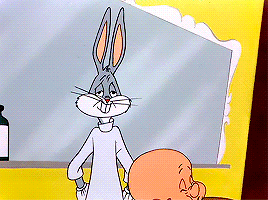
If we see a big, loud, powerful jerk try to stomp on someone small and innocuous, we're inclined to root for the small and innocuous person. This setup makes us very eager to see the small and innocuous person use tricks and shenanigans to make a fool of the powerful jerk, and it automatically makes us more okay with the sympathetic character doing on-paper unheroic things like lies and manipulation as long as they're doing them to someone we're primed to dislike.
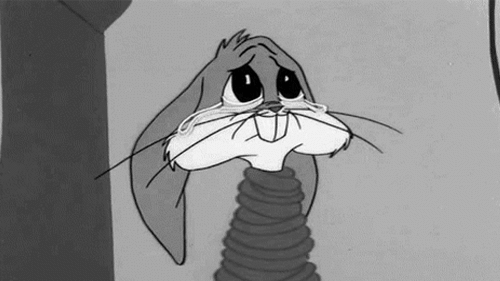
So trickster heroes are usually fundamentally reactive characters. Something bad happens and they respond by unleashing hell. Another easy way to make a character instantly more heroic is to give them an even weaker, even more sympathetic character to protect or assist. Thus, many trickster heroes have a suite of supporting characters they're protecting who are not tricksters by nature, and are instead just there to be endangered or bullied by Nasty Mean Powerful People. Our trickster heroes stepping in to aid and protect other people thus gives their actions an even more heroic cast, because not only are they reactive to an outside threat, they're selflessly reactive.
This is the framing that's used in Leverage, where every episode has a victim of the week being cruelly taken advantage of by a jerkass of the week, at which point our team of liars, grifters and thieves roll up to ply their trade on the jerkass and award the spoils of war to the victim of the week. Because the person they're tricking is proven unequivocally to be truly awful and completely insulated from legal consequence a solid 98% of the time, we don't feel particularly bad seeing our team of heroes manipulate, gaslight and eventually absolutely destroy them over the course of a crisp 40 minutes. The vileness of the villain combos with the innocent powerlessness of the person they're advocating for, and thus their assorted unheroic qualities become reframed as absolutely heroic due to the circumstances under which they use them.
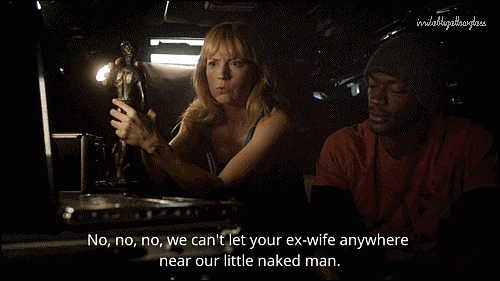
Crucial to the formula is the horrendous nastiness of the villain of the week, because if we were even kind of sympathetic to them, the schemes of the protagonists would be kinda scary. They are very good at quickly getting the bad guy to trust them and then taking apart everything they've built, and that's only fun to watch if the audience is 100% sure the villain deserves it and is not going to spend too much time thinking "wow, it would be terrifying if that happened to me." The fact that our heroes almost always take them down simply by leveraging (heh) the bad guy's badness is a big part of what makes the formula work. Almost every episode is functionally similar to a Briar Patch scenario - "oh gosh I sure hope no SOULLESS CAPITALIST VAMPIRES take advantage of how MANIPULABLE I am to try and get my MONEY and/or VALUABLES", and then the villain's own established cruelty cascades into their downfall when it runs into the dominos our heroes have set up to expose them. And that does a lot to make the audience sympathize with a crew of four self-admitted terrible people (and Hardison, who's an angel and we're delighted to have him)
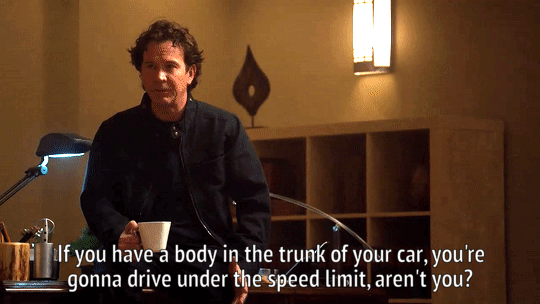
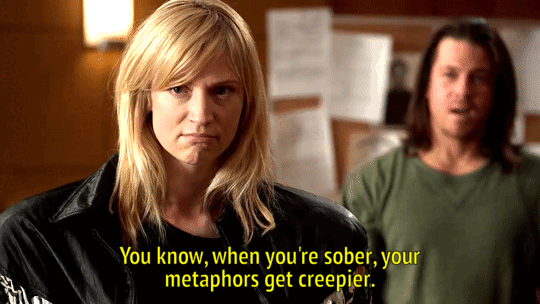
Another way to get the audience to root for a potentially nonstandard protagonist is to set them up against a villain who is smug. Smugness is a very dangerous trait for any character to have, because it primes the audience to want to see them break. A villain who thinks they are too powerful or too strong or too smart to be defeated has the audience immediately rooting for them to be proven wrong just so they can watch the expression on their face. This is the strat they use in Columbo.
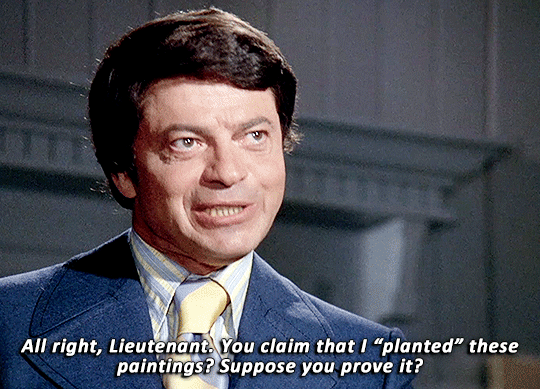
Every Columbo villain is rich and powerful and very insulated from legal consequences, and we start every episode seeing them arrange and execute an attempt at a perfect murder. We know from the start how they did it and usually why, and because they are smug - they are almost never regretful or reluctant - we become invested in seeing how Columbo figures out what they did, how they did it, and how he can prove it and get them arrested. Columbo is a nonstandard kind of trickster hero, because he is deeply and fundamentally a Lawful Good archetype, but he is also a very casual liar. The only time the audience sees Columbo almost certainly telling the truth is when he's dealing with background characters, his fellow policemen or his dog, or when he's by himself silently putting the pieces together; at all other points in the episode he will typically conceal how much he knows, how he knows what he knows and why he's asking specific probing questions. The audience has a tremendous amount of dramatic irony in terms of information about the perfect murder Columbo has to disassemble; we'll see Columbo zero in on exactly the one small detail that pokes a hole in the supposed airtight alibi, but instead of saying "I think you killed them and I am determined to prove it" he'll dance around why he's focusing on those details - just curiosity, just a desire for completeness, his superiors told him to continue the case and he doesn't know why, his wife is just such a big fan of their work, etc etc.
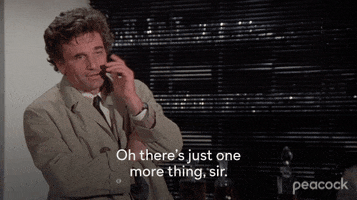
As a rule, the first time in any given episode that Columbo admits he's suspicious of the villain is the beginning of the last scene of the episode when he proves that they did it and they subsequently surrender. When Columbo is dealing with the villain, absolutely nothing he says can be trusted until that final scene - and it's a rare treat to get a glimpse of Columbo showing an honest emotion, especially something like genuine fury. Most of the time he maintains a very harmless and affable attitude, but sometimes when the villains are very smug and they know he's suspicious of them but can't prove anything yet, his righteous anger peeks through and we see why he does this.

He's a trickster hero because he can't unravel the case, the villain's motivation and the shape of the crime if the villain knows everything he knows and can correspondingly keep up with him. But he is 100% committed to exposing the truth of the situation and making the murderer face justice. Their perfect alibi is supposed to protect them from everything, but it's their confidence and certainty that they could never be caught that Columbo leverages to win. They never know entirely what to make of him, and he's never wholly honest with them - and with the audience - until the very end of the episode. It's good, cathartic payoff to an episode's worth of lies and manipulation from both main players, and it's always fun to see the non-smug party on the side of justice come out on top.
Some trickster heroes are more like standard heroes with trickster tendencies that occasionally surface. These guys are usually pretty straightforward, but in a pinch they can bust out a surprisingly cunning scheme or two - one such moment hits at the climax of Across the Spider-Verse, and it's a great moment of characterization for Miles, who has thus far been a pretty typically heroic guy who has unfortunately spent the entire movie thus far being lied to by people he trusted. It kicks off an enormously long and complicated chase sequence that takes the entire spider-community out of the home base chasing him through an absolutely massive complex and eventually onto a space elevator. It's such a fluid scene, you kind of just accept that it's a desperate chase sequence - Miles is just running. It doesn't occur to the other spider-people that Miles might have a plan beyond running until he basically tells Miguel that, hey, he did just get every other spider-person out of the facility that has the portal to get him home. He wasn't just running away, he was luring everybody away so he can leave.
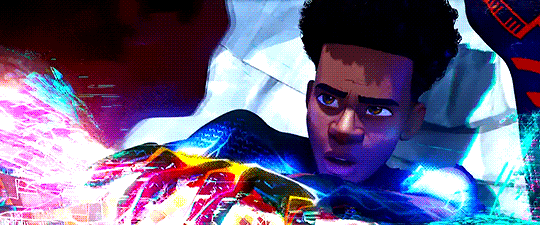
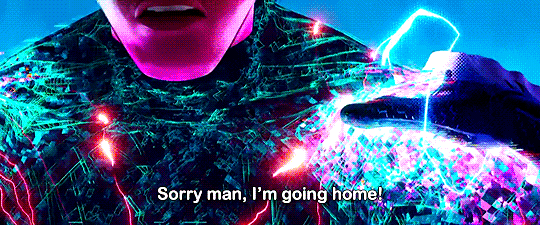
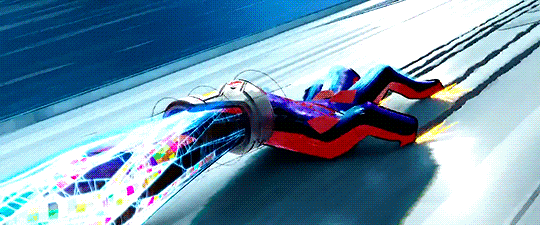
And this moment is fantastic on a meta-level, because Spider-Man is traditionally a bit of a trickster hero. Most of his enemies are able to physically outpace him, and he needs to use mobility and strategy to take them down, often luring them into environments that work against them - like a fun moment in Spectacular Spider-Man where Spidey defeats the Rhino by luring him into a steam tunnel and basically giving him heatstroke through his armor plating. But because the entire core theme of this movie is "Miles isn't a real Spider-Man," it literally doesn't seem to occur to the other spider-people that Miles's seemingly panicked running might be him pulling a Spider-Man on them. We're so used to being in Miles's head and knowing when he's got a plan or a ploy that this is a very fun moment to watch. He's successfully deceived an entire army of spider-people, and the audience is just as blindsided as Miguel - and a little less electrocuted, so it's a lot more fun for us.
So yea, trickster heroes are a fun little space of character, but you gotta be careful to put them in the right kind of situation, lest their fundamental dishonesty come across as alarming rather than extremely rad.
#I also have a reboot example but I shan't inflict that on you guys without due cause#asks#writing stuff#not aurora
1K notes
·
View notes
Text
throughout the story both kim dokja and han sooyoung define themselves in opposition to yoo sangah. kim dokja defines himself as a reader in contrast to yoo sangah as a protagonist, and han sooyoung defines herself as a villainess in contrast to yoo sangah as a heroine. outsider vs insider, evil vs good. in doing so, they dehumanize themselves and yoo sangah. kim dokja denies himself the agency that he gives a protagonist, positioning himself as merely an observer in both his life and others to cope with his mental health issues. han sooyoung denies herself any emotional or moral complexity, assigning herself a simple role she feels most comfortable in due to her own self worth issues as a way to conceptualize how her 'genre' as changed around her.
as coping strategies, these kinda suck ass. they hurt themselves in doing so, and they hurt yoo sangah. the overlapping roles they assign to her - protagonist and heroine - make unrealistic demands of her, project a perfection that isn't real, put her in a box and ignore all attempts to escape it. they distance themselves from her and damage their relationships in the process. and a large part of yoo sangah's character and arc is her either fighting back against this dehumanization or just refusing to play ball as a way to deconstruct the heroine archetype. when she is dying she uses what seem to be her final moment to make one last escape attempt of kim dokja's idolization of her, reminding him of the pepper incident and forcing him to recognize her as not just a person but a friend. and during moments when she and han sooyoung are at odds, their different attitudes towards it are so stark - han sooyoung regards it as almost a battle of good and evil, whereas yoo sangah sees it as a more personal argument. han sooyoung's discomfort comes from a clashing of philosphies, whereas yoo sangah's comes from the fact han sooyoung is kind of a fucking bitch who has killed people she cares about and might again.
when kim dokja and han sooyoung categorize the world in this way, they dehumanize themselves and their loved ones. and yoo sangah refuses to play along, recognizing both her own and their humanity and forcing that same recognition onto them. when kim dokja and han sooyoung build a wall between themselves and yoo sangah, defining themselves by that distance, yoo sangah climbs it. yoo sangah doesn't just expose the dangers of the small box she gets shoved in, but exposes the others as well. she's an incredibly important character for orv because she does exactly that - it's an extension of her larger role in the narrative as someone who challenges roles and tropes of the genre, who reaches across the divide caused by these expectations we create for ourselves and others and says hey, im just a person, just like you. so maybe we should hang out sometime and just be that, yeah?
339 notes
·
View notes
Note
Hiii, I have read all your work and it is very good :D!! I've read it several times and never get bored.
Can I ask about something? I'm curious about the characteristics or signs of yandere appearing in Tim. Will he be the last family member to become a yandere? Sorry I asked like this because I feel like he's not getting enough attention in drabbles, questions from other readers, or anything else. So I'm curious.
I hope you understand my question. Because English is not my first language.

— masterlist !
don't mind me using the tags here, i want to clarify a lot of things.
hi anon!! don't worry about your english, i understand perfectly and it's also not my first language too hehe. and to all the others who have asked about tim's (or any other characters') appearance in the series: fear not, nobody is getting ignored at all, i intend for everyone to have their designated events/moments that trigger yandere characteristics for the reader for each chapter. it's my plan to make them each as unique as possible with their intentions, motives and goals, not just them being simply "obsessed" with you, so i'm trying my best to add depth to the story.
that means the entire series will stretch out quite a lot (i already have outlined multiple arcs, flashbacks, and all the characters' individual traits and significance). it's not just going to be ten chapters, i want to remind others that there's more lore to just the neglect, your mother's dark past, and characters that haven't even been introduced to the plot yet, so if you guys prefer one-shots or something shorter, then the series is not for you folks, sorry 😭
as for tim, he is quite literally my favorite character (surprise!), so of course he's going to get special treatment. he's not going to be the last to become yandere, but his spiral to becoming a yandere takes quite a lot of time since compared to others, it's him who spends the least amount of moments with you. even in the non-neglected au i wrote, what triggered his obsession was mere curiousity.
though just because there're lesser events with him, doesn't mean there will be none. he certainly plays a major role in the "wild goose chase arc where the family tries to negotiate (kidnap) you whilst you try to escape to multiple cities/end up in a completely different country". he may not express his love for the reader well, but he most definitely knows the most about you.
oh! and the traits that he does have as a yandere looks tame when you compare it to others, but it's also because it manifests through his personal dialogue (as i reckon he's keeps most of his thoughts about you to himself most of the time (gatekeeper archetype) and he's the character with the most internal dialogue/thoughts too). he's the worst stalker you could have, the one who you should look out for the most with just how much he knows about you in such a short period of time. tim's intelligence and detective skills knows no bounds, and he won't stop exhausting himself until the very knowledge of what the blood pumping under your skin feels like and the exact temperature of your body— is extracted and stored into the terabytes of data he has into his personal batcave.
and spoiler alert: he's also the one who uncovers your mother's past and alongside bruce, what had happened between the period of time when you were dragged out of the closet and the other time in elementary when you were nearly kidnapped, which completely leads to another arc wherein it's where their obsession drives off to a completely different plane of existence, exalting vengeance on the people who tormented you; but tim's pettiness is just on a whole nother level.
and i have to stop here before i (excitedly) spoil the entire series' plot LMAO. my answer to this is a bit more casual to the other asks, so i hope it doesn't irritate anyone.
so thank you for asking this! i also have a question for you people too:
how is the current progression of the plot? i get that it isn't even 10% finished and some moments feel slow, but i try to be as immersive as possible to the readers. so for those who have read the entire thing, what do you want me to possibly add, or does anyone have other clarifications? can anyone tolerate a fanfic that can possibly lead to more than 250k words??? 😭

#🍨... yael's talking#🧁... yael's misc.#series: again & again#yandere#yandere dc#yandere batfam#yandere dc comics#yandere batfamily#yandere batfamily x reader#yandere tim drake#platonic yandere#yandere x reader#yandere x you#yandere x y/n#yandere x gn reader#yandere x darling#yandere x male reader#yandere headcanons#yandere imagines#soft yandere
322 notes
·
View notes
Text
oof man I've been loving severance in general but I think that last episode is the first one I have like lots of Thoughts about that I feel like I can at least kind of string together lol. Like I was moderately worried about what direction the Dead Wife thing was going to go in. Because it would have been so easy (and kind of disappointing) for her to just ultimately be an object that exists as a goal/motivator for other characters and not a person (as is common with Dead Wife characters, both literal and not so literal); that's sort of what she's been so far, with just the tease that she could be more. And unless they drop the ball big time (which god I hope they don't), this episode already made it clear: she IS more. Like revealing her to be both physically AND mentally alive at this point in the story is such a good writing choice and feels SO crucial to escaping from some of the really cliché permutations that these kind of basic story arcs/character archetypes can fall into.
I know everyone's been doing the orpheus/eurydice comparisons and now I know people are talking about how mark and gemma are now both actually the orpheus to each other's eurydice, but it's also this: gemma has been split into who knows how many people. She's his eurydice. She's his orpheus. And she's her own orpheus, too. Because she gets herself out of the underworld and then, not remembering she has, she's sent right back down again. And she hesitates and turns around one more time. But she doesn't know. She doesn't even know what she's really looked back at. She doesn't know the world she's sent away. Not until she's back in the underworld, and she's eurydice again.
Also! To interplay him remembering her, give us a classic Dead Wife Sequence- complete even with some of the classic images! The beautiful woman smiling in nature, lying in bed, looking at you, the light warm for the very first time- with the cold, stark reminder that she isn't actually dead, and more than that is still conscious and trying to get out and find him- is SUCH a cool move. Like it totally flips the idea of the Dead Wife Sequence on its head. It's not just grief anymore. It's not just using a lost person as a prop that our hero fights on in memory of. It's the Dead Wife Sequence as horror.
Because she's still the Dead Wife and yet at the same time it dramatically shifts her role in the story, right? Because it turns out everything she is to Mark, he is to her. This unreachable person who you now know isn't dead but who you cannot get to and you cannot know the true present reality of you can only take the word of people you don't totally trust or know. And so, they are dead. But now you know it's only to you. Because we've seen them both now, and we know they're both not just alive, they're fighting.
("she's not dead, she's just not here")
She's not your Dead Wife but you can't help the fact that in your memory, in your mind, she is. So you're the one, in a way, that's killing her. And you're her Dead Husband. "He's moved on" and you know that's a lie but does it really matter until you see him? Until he's real again? Because until then, you're both choking on ghosts.
And the ghosts aren't even really there.
#i am rotating this show around in my brain im actually obsessed like ????#severance#severance apple tv#mark scout#gemma scout#ms casey#random thoughts
125 notes
·
View notes
Text
Help Us Choose Our Next Game!
We received so many wonderful submissions from the indie ttrpg community of games to play next on Tiny Table. We need your help to narrow them down! We will be taking the top 3 games to Patreon for our patrons in the Mini and Micro tier to vote on.
Reactors and Romance: Reactors and Romance is a rules-light RPG about flirting while piloting a giant robot. You only have one stat, and that is your HEAT 🔥. Your HEAT measures how hot your mech's reactor is getting, and how hot of a pilot you are 😉 Will you fight or flirt your way through battle? Can you keep your mech from overheating? What will it be hotshot?
To Infinity...: Inspired by Alien and The Thing, "To Infinity..." is a tabletop social deduction game where up to 4 players and 1 GM need to escape on a spaceship from an alien monster who killed the rest of the crew. What none of the survivors know is that this isn't just a monster, the alien could be any one of them...
Hellborn Descended: Hellborn Descended is an infernal TTRPG set in a modern Hell, inspired by comics and shows such as Hellboy and Helluva Boss. In Hellborn, players take on the role of sinners, demons, and fallen angels, working together as mercenaries to attain wealth, fame, and power, or gloriously die trying. Check out their kickstarter!
Darkest Hour: Darkest Hour is a horror tabletop game inspired by horror movies of all kinds, featuring a group of monster hunters attempting to put a stop to a malicious supernatural entity in a single night. Over the course of six rounds, known as the Hours, the hunters must use their abilities to establish benefits that will aid them even as the haunt grows in strength and the hunters become less effective. As Blackest Night envelops them, the haunt feels insurmountable -- will the hunters find the haunt's true weakness and destroy it for good, or be whittled down until only a Final Girl remains? Featuring six haunts, six locations ripe for the haunting, and six unique hunter archetypes, Darkest Hour is perfect for one-shots for 2-5 players, and can either be run by a GM, or communally without a GM.
Dawn of the Orcs: Dawn of the Orcs is a GMless dark fantasy worldbuilding and roleplaying game. Play the magical technocrats who create the first orcs as living weapons and tell the story of how the Orcs become their own people. It can be played seriously as a fantasy transhumanist Dr. Strangelove, or as a wacky game of Saruman by committee.
The Trains of the Glorious Republic of the People: The Trains of the Glorious Republic of the People is a tabletop RPG where players take on the roles of a train crew in a fictional 1930s totalitarian state. Your mission is simple: get yourselves and your unique train from point A to point B though things are never that easy on the tracks of the Glorious Republic. The game requires only d6s, pen, paper, and, above all, your loyalty to the party.
Paratype: Paratype takes place in the aftermath of an apocalypse where giant bugs have reclaimed the earth. For humans survival is a challenge-one helped by the invention of a device that grants strange new buggy abilities. Paratype is a game about survival, humanity and so, so many bugs.
Broke Wizards: Broke Wizards is a light, silly game about working class sorcery. Play as students of the prestigious Audment's Academy of the Arcane who must go delving for treasure in order to pay tuition. To cast magic, wizards must use items found around their dormitory as makeshift spell ingredients - and then use their real-life argumentative skills to convince the living force of magic that yes, actually, a dirty shot glass is a great ingredient for casting a spell of water breathing, thank you very much.
RiskTaker: RiskTaker is a GM-less system built around players making big moves with big risks. Each sessions revolves around "The Scene," a climactic event like an episode's final battle in a superhero TV show, or the aftermath of a heist gone wrong. Players take turns either doing exposition scenes to give context to The Scene and built character relationships, or Influencing The Scene, which means they take a decisive action and decide how effective that action will be. But watch out - the more impactful your action, the more things can go wrong, and the more likely it is that they will. But what's a good story without a few Risks?
'til it kills us: in ‘til it kills us, you play as a group of young, reckless queer activists fighting to make a difference in the world. you’re angry, and you’re scared, and rightfully so. not to mention, you’re all a little bit fucked up. whether you’re dealing with issues at home, struggling with mental illness, or just learning to stand on your own two feet, life isn’t easy. but you’re also in love with the world, and with each other, so you keep fighting anyway. it’s the only thing you can do. the only problem is your magic. sure, it protects you. sure, it helps you fight. but you can feel it – feeding on the most unpleasant parts of you. and the longer you have this magic, the more you fear by those feelings. you worry it might be powering but you keep fighting. what else is there? remember what you always said: we’re going to keep on fighting ‘til it kills us.
If you submitted a game to us and don't see it on the list, don't fret! We will be hosting many polls like this and your game is still in consideration. If you game is on here and isn't chosen to move on to our next poll, also don't fret! We may add it on to the next poll again.
#indie ttrpgs#indie ttrpg#ttrpg#tabletop rpg#ttrpg podcast#tiny table#reactors and romance#paratype#'til it kills us#RiskTaker#Broke Wizards#Dawn of the Orcs#The Trains of the Glorious Republic of the People#Darkest Hour#to infinity...#hellborn descended
167 notes
·
View notes